

Ph.D scholarships in Germany for International students 2024-2025
Find Ph.D scholarships for international students to study in Germany 2024-2025.

Hertie School Doctoral Programme in Governance for International Students 2024
With a PhD obtained in Doctoral Programme in Governance, students are at the cutting edge of social science knowledge in a field that has emerged as one of the most important and dynamic fields of inquiry. It brings together perspectives from economics, political science, law, and sociology, an
Published: 19 Dec 2023 Type: PhD Study in: Germany Deadline: 01 Feb 2024

DAAD Research Grants – Short-Term Grants for Doctoral and Postdocs Candidates 2024
DAAD grants for doctoral candidates and young scientists and academics wishing to carry out research and continue their education in Germany for up to 6 months The primary aim of this programme is to promote research projects within the context of doctoral programmes. The scholarships are funded
Published: 06 Nov 2023 Type: PhD Study in: Germany Deadline: 15 Mar 2024

DAAD 2023 Research Grants – Doctoral Programmes in Germany for Young Foreign Academics
DAAD research grants provide young foreign academics and scientists with an opportunity to carry out research and continue their education in Germany. There are funding programmes for various qualification phases and stages in a career. The grants also promote the exchange of experience and networki
Published: 05 Sep 2023 Type: PhD Study in: Germany Deadline: 20 Oct 2023

University Of Bonn 2023 BIGS-DR Doctoral Scholarship Program for Developing Countries
The Bonn International Graduate School for Development Research (BIGS-DR) is the doctoral program at ZEF. BIGS-DR is part of a group of international graduate programs at the University of Bonn, a graduate framework that maintains the highest level of academic quality. There are two way
Published: 09 May 2023 Type: PhD Study in: Germany Deadline: 31 Aug 2023
.png)
Leibniz Institute of European History (IEG) 2024 Fellowships for Doctoral Students, Germany
These are open to PhD students from Germany and abroad who have at least a Masters level degree in history, theology or another discipline which works historically. They must have been pursuing their doctorate for no more than three years at the time of the appliaction deadline, substantiated except
Published: 04 Apr 2023 Type: PhD Study in: Germany Deadline: 15 Aug 2023

Beyond Borders 2023 Scholarships for Different Stages of Ph.D. Research, Germany
Beyond Borders invite applications from Ph.D. students worldwide studying borders and bordering phenomena in different regions of the world for Beyond Borders Scholarships. BEYOND BORDERS supports research about borders and boundaries in past and present times. It promotes interdiscipli
Published: 16 Apr 2024 Type: PhD Study in: Germany Deadline: Not Specified
Beyond Borders 2023 PhD Scholarships
Beyond Borders’ invites applications from Ph.D. students worldwide studying borders and bordering phenomena in different regions of the world. The Call for Scholarship Applications 2022 is open till 1 March 2022 and focuses on “Borders, Migration and Knowledge. ‘Beyond Bor
Published: 22 Feb 2023 Type: PhD Study in: Germany Deadline: 01 Mar 2023

Universität Hamburg 2023 Albrecht Mendelssohn Bartholdy Graduate School of Law
The structured PhD programme of the Albrecht Mendelssohn Bartholdy Graduate School of Law welcomes applications of graduates from both legal studies and other disciplines who are keen to produce ambitious doctoral work in an excellent research environment.
Published: 13 Feb 2023 Type: PhD Study in: Germany Deadline: 15 Feb 2023
University of Bonn 2023 Argelander Scholarships for Doctoral Candidates from Developing Countries
Applications are open for the Argelander Scholarships for doctoral candidates from universities in the Global South. The aim is to provide funding for doctoral candidates from countries in Africa, Latin America and Asia in order to promote scientific exchange with partners, particularly in region
Published: 18 Jan 2023 Type: PhD Study in: Germany Deadline: 01 May 2023
DAAD 2023 Graduate School Scholarship Program for PhD Students
The Bremen International Graduate School of Social Sciences (BIGSSS) invites applications for 2 scholarships for international doctoral researchers in its new Graduate School Scholarship Program “Global Dynamics of Social Policy and Social Cohesion” (GSPSC), funded by the
Published: 07 Dec 2022 Type: PhD Study in: Germany Deadline: 23 Jan 2023

DIW Berlin 2023 FULLY FUNDED 5 Years PhD Scholarship (Germany)
DIW Berlin 2023 FULLY FUNDED 5 Years PhD Scholarship Germany. is open for International Students . The scholarship allows PhD level programm(s) in the field of Economics, Business studies taught at German Institute for Economic Research . The deadline of the scholarship is 12 Feb 2023. DIW B
Published: 23 Nov 2022 Type: PhD Study in: Germany Deadline: 12 Feb 2023

University Of Hamburg 2023 PhD Scholarship (Germany)
Are you seeking doctoral funding? The University of Hamburg offers doctoral scholarships and grants of up to € 1.200 to (prospective) doctoral candidates studying at the University of Hamburg.
Published: 21 Nov 2022 Type: PhD Study in: Germany Deadline: Not Specified

Freie University Berlin China Scholarship Council Doctoral Awards in Germany 2023
One highly successful example of the university’s efforts to recruit qualified junior scientists and scholars is its work with the China Scholarship Council (CSC). As part of a special program sponsored by the Chinese government, the CSC awards about 6,000 foreign scholarships each year to Chi
Published: 17 Nov 2022 Type: PhD Study in: Germany Deadline: 15 Jan 2023
University Of Hamburg - Doctoral Scholarships in Germany, 2022
Doctoral scholarships at Universität Hamburg Are you seeking doctoral funding? The University of Hamburg offers doctoral scholarships and grants of up to € 1.200 to (prospective) doctoral candidates studying at the University of Hamburg. We are happy to assist you with any
Published: 16 Nov 2022 Type: PhD Study in: Germany Deadline: 02 Dec 2022

University of Bayreuth 2023 BIGSAS-Scholarships for African Women Scholars (Germany)
BIGSAS has been awarded two scholarships within the Graduate School Scholarship Programme (GSSP) by the German Academic Exchange Service (DAAD) for which BIGSAS will nominate candidates who have successfully passed the application procedure. BIGSAS provides a centre for creative a
Published: 01 Nov 2022 Type: PhD Study in: Germany Deadline: 15 Dec 2022
Are you seeking doctoral funding? The University of Hamburg offers doctoral scholarships and grants of up to € 1.200 to (prospective) doctoral candidates studying at the University of Hamburg. We are happy to assist you with any questions regarding our scholarship!
Published: 03 Oct 2022 Type: PhD Study in: Germany Deadline: Not Specified
.png)
DAAD United Nations University 2022 Doctoral Research Scholarship for Researchers
The United Nations University (UNU) is an international community of scholars engaged in policy-oriented research, capacity development and dissemination of knowledge in furthering the purposes and principles of the Charter of the United Nations. The mission of UNU is to contribute, through research
Published: 05 Jul 2022 Type: PhD Study in: Germany Deadline: 10 Jul 2022

Universität Leipzig 2023 Joint MA & PhD Peace and Security in Africa Scholarships for African Students
Be part of a unique transnational MA & PhD experience in which you graduate from two prestigious universities in Africa and Europe. Addis Ababa University in Ethiopia and Leipzig University in Germany jointly offer a two year MA program AND a three year PhD Program that
Published: 18 May 2022 Type: PhD Study in: Germany Deadline: 15 Feb 2023
- Best Scholarships
- Sanlam Actuarial Bursaries for South Africans 2025
- University of Pretoria Queen Elizabeth Commonwealth Scholarship for Master studies 2025 (Fully funded)
- Mastercard Foundation Graduate Scholars Program at University of Gondar 2024
- Bond University Vice Chancellor's Elite Scholarship 2024
- University of Sheffield Africa Scholarship for Postgraduate Students from Africa 2024
- Apply Now: Australian Government Research Training Program (AGRTP) Scholarship 2024
- Monash University Raydon Graduate Research Scholarships 2024
- Swansea University Eira Francis Davies Scholarship for Female Students 2024
Scholarship Tips
- 30 Best Medical Universities In The US 2024
- Tips To Find And Apply For Scholarships Online
- 30 Best Study Techniques To Try This 2024
- 26 Best Country To Teach English 2024
- 26 Best Free AI Chatbot 2024
- 20 Best Countries To Relocate 2024
- 30 Best Countries For Tourism - Top Tourist Countries
- Canada Work Visa Application Process
Scholarships by Country to Study
- United Kingdom
- United States
- South Africa
- Netherlands
- New Zealand
Scholarships by Category
- Postgraduate
- Undergraduate
- College School
- Entrepreneurs
- Bachelors Degree
- Women Scholarships
- Fully Funded
Scholarships by Country of Origin
- African Students
- Developing Countries
Scholarships by Institution / Company
- Flinders University
- German Academic Exchange Service (DAAD)
- University of Edinburgh
- The World Academy of Sciences (TWAS)
Scholarships by School
- University of Melbourne
- University Of Queensland, Australia
- University of East Anglia
- University of Kent
- Privacy Policy
- Terms of Use
Scholarships
- Undergraduate Scholarships
- Masters Scholarships
- MBA Scholarships
- Ph.D Scholarships
- Fellowship Scholarships
- Fully Funded Scholarships
- F1 Visa Interview Questions And Answers
- Scholarship Application Letter
- Letter Of Intent For Scholarship
- Personal Statement For Masters
- Motivation Letter For Scholarship
- Scholarship Acceptance Letter
Other Locations
- Scholarships in UK
- Scholarships in Canada
- Scholarships for Nigerian Students
- Scholarships for African Students
- Study Abroad Community
- { expandedNavigation=true; activeIndex=0; }"> Research landscape
- { expandedNavigation=true; activeIndex=1; }"> Your goal
- { expandedNavigation=true; activeIndex=2; }"> Plan your stay
- { expandedNavigation=true; activeIndex=3; }"> Success stories
- { expandedNavigation=true; activeIndex=4; }"> Our service
- R&D policy framework
- Research infrastructure
- Research funding system
- Universities
- Universities of applied sciences
- Technical universities
- Top universities
- Fraunhofer-Gesellschaft
- Helmholtz Association
- Leibniz Association
- Max-Planck-Gesellschaft
- Academies of sciences and humanities
- Federal institutions
- State research institutions
- What is R&D in German business?
- Why is collaboration important?
- Which sectors carry out R&D?
- Which are the leading companies?
- How do German businesses compare internationally?
- How is the start-up scene set up?
- How do I start a career?
- Good reasons
- Two ways to get your PhD
- Find your PhD position
- How to apply for a PhD
- Funding programmes
- Funding organisations
- Funding databases
- Job portals
- Career options & dual careers
- Funding & awards
- Potential employers
- Research fields
- Entry and residence
- German money-saving tips
- Cost of living
- Social insurance and health
- Bringing your family
- Information for your partner
- Support for families
- Finding a place to live
- Funding opportunities
- Recognition of professional qualifications
- Counselling
- Latest Thinking
- First-hand experiences from international researchers
- On-site consultation
- Our publications
- Research news
- Online talks
- Topics in focus
PhD students
Here you find a selection of funding programmes for international PhD students by various funding organisations. For more funding opportunities please search our funding databases .
Selection of funding programmes (alphabetical order):
Collaborative Research Centres
Collaborative Research Centres offer PhD students opportunities to pursue an outstanding research programme that crosses disciplinary, institutional, departmental and faculty boundaries.
DLR-DAAD Research Fellowships
Outstanding PhD students can complete a doctorate in the fields of space, aeronautics, energy, transport, digitalisation and security at an institute of the German Aerospace Center (DLR).
ERA Fellowships – Green Hydrogen
This programme provides funding for a research project or continuing academic training in the field of GH2.
Green Talents
The winners of this competition are invited to visit leading German institutions of environmental and sustainability research. Furthermore, Green Talents awardees can complete a research stay at an institution of their choice.
Individual Doctoral Projects at Fraunhofer Institutes
PhD students can complete a doctorate while working on exciting projects in cutting-edge areas of technology involving state-of-the-art equipment at a Fraunhofer institute.
Individual Doctoral Projects at Leibniz Institutes
PhD students can complete a doctorate while working in an excellent interdisciplinary research environment at a Leibniz institute.
Individual Doctoral Projects at Max Planck Institutes
PhD students can complete doctoral projects within the scope of research work conducted at a Max Planck institute.
International Max Planck Research Schools
PhD students can complete a doctorate in a structured programme offering excellent research conditions at one of the 68 International Max Planck Research Schools (IMPRS).
International Visiting Researchers at Max Planck Institutes
International researchers can conduct independent research at a Max Planck institute. The programme aims to strengthen cooperation and promote networking between Max Planck institutes and their international partners.
Leibniz Graduate Schools and Leibniz ScienceCampi
PhD students will find ideal conditions for completing a doctorate in a structured doctoral programme that can be pursued at either a Leibniz institute or a partner university.
Marie Skłodowska-Curie Doctoral Networks
PhD students receive structured doctoral training within these networks, which are formed jointly by different European institutions.
Max Planck Schools
The Max Planck Schools are a joint graduate programme run by German universities and research organisations. They offer ambitious bachelor’s and master’s graduates excellent conditions within a unique scientific network, and provide structured and fully funded PhD programmes in three interdisciplinary research fields: cognition, matter to life and photonics.
Munich Aerospace: PhD Scholarships
Munich Aerospace PhD scholarships allow talented young scientists to focus exclusively on the research work at hand and on attaining a timely doctoral degree.
PhD Fellowships
The Boehringer Ingelheim Fonds awards PhD Fellowships to outstanding early career researchers who wish to carry out an ambitious scientific PhD project in basic biomedical research at an internationally leading laboratory.
Research Grants – Bi-nationally Supervised Doctoral Degrees/Cotutelle
The aim of this programme is to support doctoral degrees at the student’s home university with integrated research phases in Germany.
Research Grants – Doctoral Programmes in Germany
International PhD students can realise a doctoral project (individually or in a structured programme) at a state or state-recognised German university or non-university research institution.
Research Grants – One-Year Grants
International doctoral candidates can carry out research primarily as part of a doctoral project at a state or state-recognised university or non-university research institution in Germany.
Research Training Groups
Research Training Groups are set up by universities and pursue a focused research programme. They offer a structured PhD programme relating to an innovative, peer-reviewed research topic.
RISE Professional
This programme enables students in the fields of natural sciences, engineering or computer science from North America, the United Kingdom or Ireland to gain serious practical experience in a German company or research institution with strong industry ties.
Travel Grants
The Boehringer Ingelheim Fonds (BIF) awards travel grants to PhD students and postdoctoral researchers from all over the world.
More information:
Search funding databases.
More funding programmes are available for international researchers. For more information you can either search the funding databases or go straight to the websites of the funding organisations.

Language Selector
Search portlet, menu display, scholarship and culture, stipendien & förderprogramme, ...für internationale studierende und promovierende - scholarship and culture, asset publisher, scholarship program for international students.

The Konrad-Adenauer-Stiftung (KAS) is a political foundation, inspired by Christian democratic values, committed to fostering democracy and the rule of law, to implementing social and market-economic structures and to promoting human rights in Europe and worldwide.
In line with these principles, our Foundation awards scholarships to international master students and graduates in order to enable study and research at universities in Germany. This way, we actively promote intercultural dialogues, the formation of international networks as well as the internationalization of universities and science.
The next regional selection meetings will take place in 2023 in cooperation with the KAS offices in Turkey, Singapore and South Caucasus.
After finishing their studies in Germany, the Konrad-Adenauer-Stiftung expects its former scholars to contribute actively to the development of their home country’s relations with the Federal Republic of Germany.
Currently our scholars come from 55 countries of the world. Their subjects are various: law, sciences, music as well as medicine, just to name a few.
Who are we looking for?
Our Scholarship Program for International Students is aimed at international students and graduates who have acquired a university degree and who intend to complete postgraduate or master studies, doctoral studies or a research stay of at least four semesters at a university in Germany.
The guidelines
- have a university degree, as we do not provide support for bachelor studies,
- prove above average academic performance,
- have good knowledge of the German language (B2-level),
- be actively engaged in voluntary work,
- plan to study a minimum of four semesters at a university in Germany,
- possess a broad general education and distinct interest in political issues,
- have a positive attitude towards democracy and human rights,
- be open to develop their personal points of view and practice tolerance,
- be highly motivated and able to convince us of their goals in life.
Further specifications
- Students in Medicine or Pharmacy can only apply after having completed their intermediate exam in Germany or when having achieved a comparable stage of their studies.
- Human or dental medicine specialist training or post graduate research stays in Germany cannot be supported.
- Persons having already achieved a doctorate are not eligible for a scholarship.
Benefits of our scholarship program
Our scholarship program consists of financial assistance, personal guidance, a wide seminar program and access to the worldwide KAS-network. After the successful completion of studies, we remain in contact with our alumni and involve them in our national and international activities.
Financial assistance
The duration and level of funding varies for different types of studies. Graduates (master or postgraduate students) receive a monthly scholarship of € 934. The standard funding period is two years. After having obtained unconditional admission to doctoral studies at a German university, PhD-students receive a monthly scholarship of € 1.400. The standard funding period for PhD scholars is three years. We also fund research stays in Germany for the minimum of three semesters.
Beside the monthly stipend, we offer multiple subsidies for our scholars. Upon request, we subsidize health care insurance up to the amount of € 120 per month. We also offer a family allowance of € 276 provided that you and your spouse live together in one place in Germany for at least three months and that his/her income does not exceed the amount of € 450 per month. Additionally, we grant children’s allowance of € 194 per month for children living with you in Germany. Prerequisites are the submission of an official German translation of the child’s birth certificate and the official rejection of your demand for public child allowance.
In addition, PhD-scholars can apply for financial assistance for research stays abroad. However, we do not fund participation in congresses or symposia.
Fees resulting from courses at the university in Germany that are directly related to your studies can be refunded up to the amount of € 1.500 per semester. However, we do not refund regular semester fees resulting from enrollment or annual re-registration.
Network and Seminars
Being a scholar of the Konrad-Adenauer-Stiftung means much more than just receiving financial assistance. Our scholars benefit from a broad program of ideational support. They become part of an active and living network. The program is based on three pillars: 1. Personal contact and mentoring. 2. A wide seminar program – with over 180 activities per year - for all of our app. 3.000 scholars in Germany. 3. Regional and local activities of our more than 140 different university groups.
1. Mentoring by our staff and representatives at the universities
Our staff members and representatives at the universities supervise and consult our scholars personally. They monitor the progress of your studies as well as your participation in the seminar program and the activities of your university group. Our foundation attaches great importance to the continued development of your social commitment. The overall objective is to support you in identifying and in improving your individual strengths.
2. A manifold seminar program
The objective of the seminars, which are held exclusively for our scholars, is to expand the general education of our scholars. The seminars provide opportunities for an interdisciplinary exchange of ideas and information with other scholars and acknowledged experts. The ranges of topics include historical, political, economic and social issues on a national, European and international scope. Furthermore, training and coaching seminars help our scholars to strengthen their soft skills and to facilitate the transition from studying to professional life.
3. Being part of a local university group
The local university groups, “Hochschulgruppen”, are managed independently by our scholars along with the representatives of our foundation at the universities, the so called “Vertrauensdozenten”. Each semester, they create a program of diverse activities for themselves. These local groups also help you with settling in and getting used to your new surroundings.
Our network of former scholars
It is a matter of particular interest to the Konrad-Adenauer-Stiftung to encourage networking between our current and former scholars. Over 14.000 alumni form a vibrant and global network of former KAS scholars who play active roles in politics, economics, science and society all over the world and who, at the same time, remain committed to our foundation and its current scholars. More than 50 regional alumni groups worldwide and several specialized sub-networks give great opportunities to our former scholars and allow them to remain connected to our foundation. This alumni network also provides practical assistance: its members finance a Social Fund which provides help to current and former scholars in cases of need. Moreover, the network promotes scientific and social projects.
How to apply
There are two ways to apply for our scholarship program:
1) Each year new focus countries or regions are determined for our selection procedures. In 2021 we will focus on Russia, Ukraine, Turkey and Latin America (coordinated through our office in Peru) and interviews will be conducted online. If you are living in one of these countries, you may send your written application directly to the responsible KAS office – please check their web-sites for the exact procedure and addressee. Students living in countries that are not listed cannot apply for the international selection procedure in 2021.
2) In case you are already living or studying in Germany, you are welcome to apply for a scholarship via the domestic selection program using our online procedure. Please fill out the application form online and upload all required application documents. Please do not send in any documents by mail as these will not be considered. The application period ends on July 15th (12:00/noon) each year for the domestic procedure.
Necessary documents for the application
Please download and fill out the application form and attach the following documents if you are applying for a MA-Scholarship.
- A meaningful CV in tabular form including details about your previous voluntary work or social commitment.
- Motivation letter.
- Copies of your examination certificates in German translation if the originals are not in English.
- Copies of your studies performance records if you have been studying at a University in Germany.
- Proof of German language skills (B 2).
- An informal academic letter of recommendation: This letter should provide information about your academic qualifications and potential; it should not be older than two month. The author has to be a university professor or teacher holding a doctoral degree.
- An informal letter of recommendation concerning the applicant’s personality: This letter should focus on your personality and interests as well as on your understanding of values and your social commitment. The author cannot be the same as the one providing the academic letter of recommendation.
- Certificate of admission or matriculation from your university in Germany.
If you are applying for a PhD-Scholarship, please add the following documents:
- A detailed description of your doctoral thesis: This exposé should be written in German or English (5-10 pages; font size 12; 1.5 line spacing) and should outline the central research question of your proposed project, its scientific relevance, your theoretical approach and the motives behind your choice of the research subject. It should also contain a work and time schedule and a bibliography.
- A second academic letter of recommendation: This second letter should be written by the supervisor of your doctoral thesis, providing you already have one. It replaces the letter of recommendation concerning the applicant’s personality.
- A confirmation of supervision by your doctor-father or -mother
Contact for applicants
If you have any questions regarding your application, please send an email to: [email protected] .
In case of technical problems around the KAS registration portal, please contact: [email protected] .
- event listener --> Print
- Send via mail
- --> event listener --> Share
Susanna Vogt
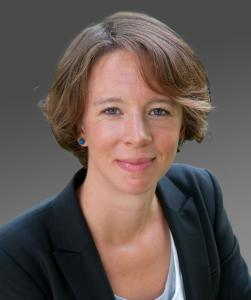
Head of Foreigner Promotion
Dr. Kerim Kudo
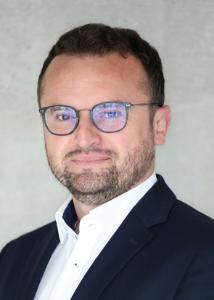
Desk Officer in the Department of Scholarships for International Students
Maike Ender
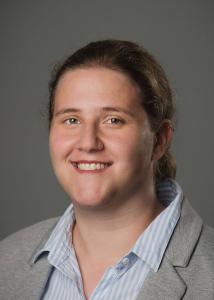
Assistent / Administrator
Giulia Mohamed
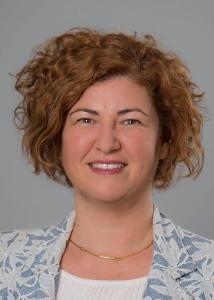
Publications to the topic
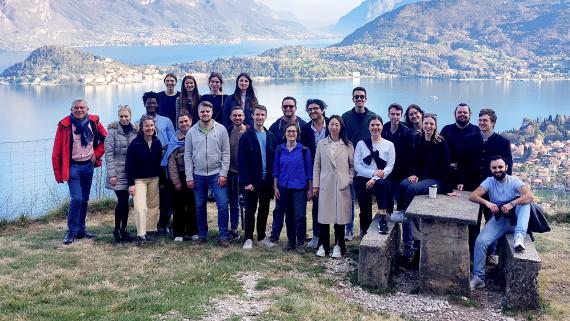
Globale Einblicke und Diskussionen bei der Cadenabbia Conference 2024
Stipendiatinnen und stipendiaten beleuchten facetten der globalisierung gefördert vom generationenfonds der altstipendiaten.
March 27, 2024
Event Reports
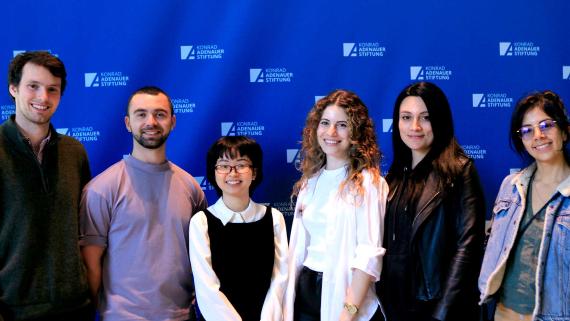
„Gemeinsam für eine Zukunft in Sicherheit“
Internationale stipendiatinnen und stipendiaten aus fast 40 nationen debattieren in berlin die zukunftsperspektiven internationaler sicherheitspolitik.
May 5, 2023
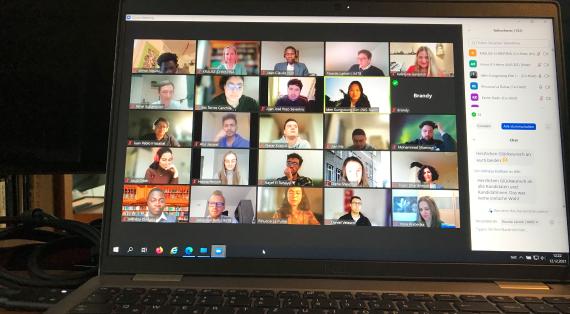
Diskussion über Frieden und Konflikt
6. nis-jahrestreffen.
Dr. Christina Catherine Krause
January 10, 2022
Supported with funds from the Federal Foreign Office
PhD Studies
Planning your phd, eligibility and application, german or english medium, living as a student, working in germany, get guidance.
With a long tradition of research and ground breaking discoveries, Germany is indeed a land of innovation and progress. Besides giving your ideas a research-based boost, Germany also offers promising career opportunities along with a vibrant social and cultural milieu. So like for many other international students, it can be the right place to pursue a doctoral degree for you too!
Take a quick look
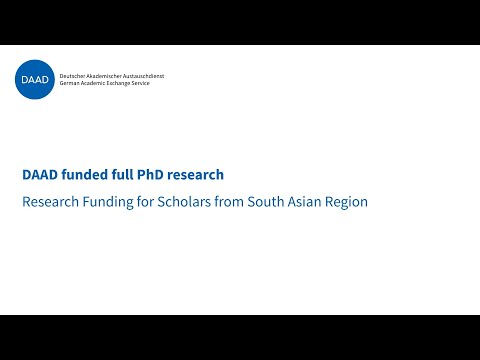
Zum Aktivieren des Videos klicken Sie bitte auf das Vorschaubild. Wir möchten Sie darauf hinweisen, dass nach der Aktivierung Daten an den jeweiligen Anbieter übermittelt werden. Auf YouTube ansehen
Starting your doctoral studies is a big step in your academic life. Along with identifying your research area you also have to plan where and in which institute you want to pursue your PhD.
Where does research take place in Germany?
Contemplating pursuing a PhD in Germany? There are a number of universities, research institutions and business houses that will welcome you. So getting an insight into the research landscape of the country is of paramount importance!
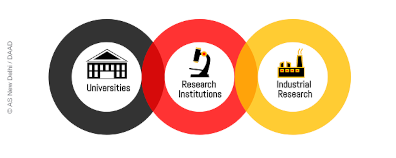
© DAAD India
Research is extensively carried out by and through universities, research organisations and the industry. These three are famously known as the three pillars of research in Germany.
You can take a closer look at this on Research in Germany .
Which universities should I look at for PhD?
There are various kinds of institutions of higher education in Germany. A majority of these belong to either of the following categories:
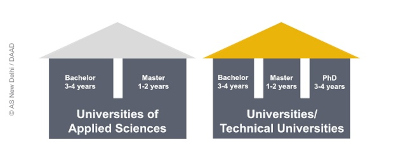
Universities and Universities of Technology (TU), are research-oriented and offer a wide variety of subjects. These are the only establishments that can award a PhD degree.
In case you are carrying out your PhD at a research organisation/ University of Applied Sciences, it will always be through a partner university/TU that you will get your degree. Therefore it is important that you fulfill the eligibility criteria of the university/TU as well.
Before you finalise a university or a research institution make sure to check out their websites to know what kind of research is already going on there.
Which is the best university in Germany?
There is no “best university”, neither in one subject and certainly not across all subjects.
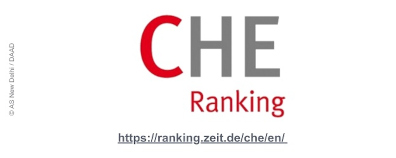
DAAD India © CHE Ranking
Germany offers a multidimensional ranking, considering various criteria that are important from a student’s perspective. For example, student and staff judgments on quality of teaching, atmosphere at the university, library and other equipment, student numbers, average study duration, number of graduations, third party funding etc. This way you get a detailed picture of the strengths and weaknesses of each university on university-ranking.de . Here you can find your programme by selecting a subject, a university or even a city in Germany!
As a researcher you should also take the research rankings into consideration. The criteria for such rankings could be research infrastructure, citations, patents, publications and student reviews, to name a few.
How should I plan my doctorate?
If you have set your mind on a PhD in Germany, you can consider two approaches: the traditional approach i.e. individual doctorate and the structured doctoral programmes.
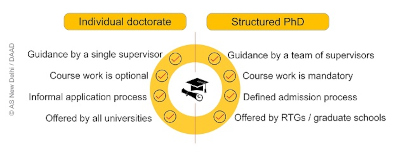
Individual doctoral studies involve identifying a supervisor ( Doktorvater / Doktormutter ) at a German university who is willing to guide your research. This system offers a lot of freedom, and calls for a great deal of personal initiative right from identifying a topic in your research field. This kind of doctorate takes about 3-5 years to complete.
Structured PhD programmes are internationally oriented, conducted largely in English and are comparable to PhD programmes offered in English-speaking countries. Here supervision is carried out by several university teachers. These programmes lead to a PhD in about three years.
What if I want to do a part of my PhD research in Germany?
The research Grant: Bi-nationally Supervised Doctoral Degrees / Cotutelle which is also famously known as DAAD Sandwich Scholarship lets you complete your PhD in two countries. The first country being your home country where you are registered as a doctoral student and the second country is but naturally Germany.
You are supervised at your home university as well as at the host institute in Germany. Your doctoral degree is awarded by the home institution. This is the well known “sandwich model”.
While generally as a Master degree holder you will have ticked off the first major requirement, it is always a good idea to check if the university’s requirements and your qualifications match. And then you can start with the application procedure.
Am I eligible to apply for a PhD?
In Germany, every university is autonomous. This means that every university/ study programme has its own set of criteria for admitting students. So please check the university website, and specifically the programme you are interested in. Here you will find the exact admission requirements.
However, some generalisation is possible. As a Master degree holder from Bangladesh, Bhutan, India, Nepal or Sri Lanka your degree is treated at par with a German Master degree. In some cases, further assessment of eligibility will be required. Do clarify the matter of eligibility with the university or the research organisation of your choice before you send in your application.
Some universities may ask for the proof of your English language proficiency in form of TOEFL or IELTS scores. Some universities may ask for good German language skills depending upon subject of your research. In such cases, your knowledge of German needs to be certified through examinations like the TestDaF or DSH.
How do I go about applying for a PhD?
- PhD Germany – A portal where German universities advertise openings for doctoral positions
- An interactive database of Graduate Schools at German universities
- Research Training Groups coordinated by the German Research Foundation (DFG)
- International Max Planck Research Schools (IMPRS) Academicians from your country who have collaborations with German academicians or your seniors who might be carrying out research in Germany can be a great source of information too!
- Contact and convince a supervisor. Make sure that you approach a potential supervisor the right way and in good time – a brief and well-structured communication with an overview of your research proposal and relevant information about yourself is more likely to get you the right kind of response than a simple email stating that you are interested in doing a PhD!
- Communicate information about your background, academic performance and academic goals.
- Get a letter of acceptance from your supervisor.
- Identify a programme. Contact the selected university. This will be your most important source of information as far as exact details about eligibility, programme structure, fee, application procedure etc. are concerned.
- Check the application deadline for the programme chosen!
- Application forms and other relevant material can be downloaded from the respective university website.
- Send the application packet.
- Get a confirmation of admission.
- The Admission procedures vary for different universities and for different programmes.
- Check about these with the university of your choice or your supervisor.
- Make sure you have a valid passport!
- Apply for a student visa as soon as you have the admission letter, as the procedure can take 8 to 12 weeks. The German Embassy and the Consulates require proof of funding for the first year of studies. At this stage make sure if you need to get the APS certificate ( www.aps-india.de ) that some universities/host professors may insist upon. To find out where you should apply for a visa, visit the website of the Germany Embassy in your country.
- Apply for a place in a hostel. In some cases the International Office ( Akademisches Auslandsamt ) of the university will help you.
- Arrive in Germany at least a week before your course begins.
- Contact the International Office ( Akademisches Auslandsamt ) of your university for guidance.
- Step 6 Get your residence permit within the first three months of your stay in Germany from the Foreigners’ Registration Office ( Ausländeramt ).
Germany offers education in German as well as in English. Different subject fields can have different language requirements.
Can I do my PhD completely in English medium?
Germany offers close to 200 structured international programmes with English as the sole or primary medium of instruction. These programmes are called International Programmes.
Few of these programmes may require students to have learnt/learn some German language during their PhD.
Must I learn German for my PhD?
As you have already seen, Germany offers numerous PhD programmes with English as the sole or primary medium of instruction and the language for your thesis. English is also accepted as a language of research and education in Germany.
However, some universities/ subject fields may expect you to have German language proficiency for your PhD.
As a student in Germany, your life will not be limited to the university campus. You will surely want to interact with people, travel through the country-side and make the best of your time there. This is where knowledge of German will present a great advantage!
Universities offer beginner and well as advanced level courses where you can learn German. You can also start learning the language while you are still in your home country at a Goethe-Institut (Max Mueller Bhavan) / Goethe-Zentrum.
Do I require to learn German for DAAD scholarship?
To apply for the DAAD PhD scholarship knowledge of the German language is not mandatory. However, after getting the scholarship you will be expected to complete a DAAD sponsored German course. This will help you with your life Germany.
While in a foreign country being able to manage your finances on your own is very important. You would need to plan your budget by keeping your living expenses, travel costs and tuition fees if any in mind.
What kind of budget should I have in my mind?
Fees: As a PhD scholar in Germany, you are exempted from tuition fees. You will need to pay a semester contribution of around Euro 300, depending upon the university and the services or benefits provided.
Living costs : Apart from the tuition fees, if any, you will require about EUR 934 per month for subsistence i.e. housing, food, clothing, study material and other expenses such as health insurance and leisure activities. The precise split up for this amount will be updated soon. The amounts can vary from city to city, and of course from lifestyle to lifestyle!
The following table shows the split up at the time of the last budget indicated in 2019.
Source: German Student Union (Deutsches Studentenwerk), 2019
How can I finance my doctorate?
If you are participating in a structured doctoral programme and doing your doctorate at a graduate school, research centre or research training group, the issue of funding is usually resolved with you either working as a research assistant or receiving a scholarship of about EUR 1,000 per month.
If you are pursuing your doctorate on the basis of the traditional approach, you can apply for a job as a research assistant, if there is vacancy.
Working as a research/doctoral assistant involves collaboration in research/teaching and doing administrative work in addition to completing the dissertation. Non-university research institutions like Fraunhofer Institutes and also some companies offer doctoral candidates employment and / or fund their doctoral dissertations.
The DAAD offers the most extensive scholarship programme. Also a number of foundations support international candidates approved for the doctoral process. A database of scholarships offered by various German organisations can be found at www.funding-guide.de .
What is a DAAD PhD scholarship like and how can I apply for it?
If you are a well-motivated researcher with high-calibre this research grant supports your complete doctoral studies in Germany. In general the duration of your PhD should not exceed more than four years.
If you have already registered for PhD in your home country and would like to carry out a part of the research in Germany, you may consider applying for Bi-nationally Supervised Doctoral Degrees / Cotutelle scholarship of the DAAD .
An independent selection committee consisting of specialist scientists reviews your applications, wherein your academic qualification, quality of your research project is checked along with your career prospects, motivation and extra curricular activities including your civic engagement.
If you want to do your full PhD in Germany DAAD PhD Scholarship would be more relevant for you. The application deadline is 20 October every year. This is for scholarship starting from October of the following year.
Here is a step-by-step guideline for your application process:
- Collect general information about the DAAD PhD scholarship.
- Thoroughly check the eligibility criteria.
- Attend information sessions or internet-based seminars (webinars) organised by the DAAD.
- Once you have the letter of acceptance from your supervisor/admission letter from your university, complete the application procedure as specified in the scholarship announcement.
- The application deadline typically falls in the month of October the current year for a PhD beginning in the next year.
- Shortlisted applicants from India will be invited for a personal interview around January-February. For Bangladesh, Bhutan, Nepal and Sri Lanka the procedure will be announced closer to the date of interviews.
- The final decision will be announced for applicants from Bangladesh, Bhutan, India, Nepal and Sri Lanka around mid or end of April of the following year.
- Step 4 Once selected, you will have to attend a mandatory German language course, which is a necessary and important part of your scholarship.
- Step 5 After the successful completion of your language course in Germany, your PhD will begin in October.
Living on your own comes with lots of responsibilities, at the same time it can also be very interesting. It starts with finding a place to stay, learning how to cook, shopping on a budget, making friends and connections. Hope this section helps you with some of your questions.
How do I find accommodation?
Germany offers various types of accommodations:
- Students hall of residence: Here you can rent rooms provided by Student Services Organisation ( Studentenwerk ). They are low in cost and preferred by many students. Studentenwerk also provides specially designed Service Kits for international students. Get in touch with Studentenwerk of your city know more.
- Shared Flats ( Wohngemeinschaft – WG) : Shared flat or WG is another affordable accommodation, where you have your own room in a flat and share the kitchen and the bathroom with other flatmates. Living in a shared flat is cheaper as the rent and other expenses get shared. You can find advertisements for vacancies in WGs online on social media groups or on student-friendly websites.
- Private apartments: If you prefer living alone, private apartments can be an option for you. You can find them with the help of Studentenwerk, on boards in the university foyer or even on social media groups and websites for rental real estate.
Make sure to be on the lookout from early on, so that you find the best place at an affordable price.
How do I connect with other students?
Connecting with other students can help you to learn from their experience. It may also help you get acquainted with the lifestyle, once you are in Germany.
- Get in touch with DAAD Young Ambassadors . They have studied or carried out their research in Germany. Contact them with your questions, they will be happy to guide you!
- You can also find out about various student associations and groups formed by students of your country/ region.
- You can contact students on various socials media platforms as well. There are groups based on nationalities or interests and activities.
- Many universities arrange introductory events. Ask the international office of your university about them. Research institutions too generally run such initiatives.
You can of course work in Germany as long as you follow the regulations, which are not complex and are easy to understand.
Can I work in Germany as a student?
As an international student, you are permitted to work for 120 full days or 240 half days in a year. This will help you in getting a bit of extra pocket-money!OK
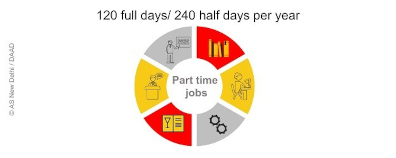
Can I work in Germany after my studies?
After completing your degree in Germany, you can choose from amongst a wide range of options:
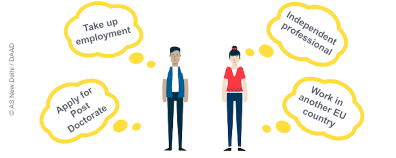
You can stay on in the country for up to 1.5 years to look for a job that is in keeping with your education. Once you find a job, the residence permit issued to you for the purpose of studying, can be converted into a residence permit for taking gainful employment.
Germany has always had a very strong industry-academia linkage. A lot of scientific research is funded by the industry as well. During your studies you can get the opportunity to do internships with German companies, which can open new vistas for your professional career.
In Germany, a doctorate is a prerequisite for a career in research or higher education. Your options include:
- Teaching/Research Assistantships
- Postdoc Positions
- Research Positions in Industry
The portal www.academics.com has Germany’s biggest online job market for researchers. There are also scholarships for Postdocs offered by the Alexander-von-Humboldt Foundation and other organizations.
Whether you are in India, Nepal or Bhutan, the DAAD is there to help you with your study in Germany plans. Check out how you can reach us!
Individual Appointments
You can connect with the DAAD offices online or offline in Bengaluru , Chennai , New Delhi and Pune .
Information Sessions
The DAAD offers free of cost information session about studying in Germany regularly. Check which dates and topics suit you, register and join!
Click here for dates, timings and registration links: www.daad.in/events .
Writing a Research Proposal
Take a look at the DAAD’s guidelines for writing research proposal
Research Proposal writing: Guidelines 2023
PhD Proposal Writing Workshop
Wondering how to write a PhD proposal? The DAAD offers PhD Proposal Writing Workshop on various topics for aspirants who intend to pursue their doctorate in Germany!
Early Career Research Symposia
The Early Career Research Symposia offer you a platform to help you propel your research, amplify its reach and get inspired by exchange of ideas.
- Did you find the information about doctoral studies in Germany useful? Keep the digital PhD brochure with you, so that it is all handy!
- You will also find the digital brochure Research Proposal Guidelines 2023 useful.
- There is comfort and certainty in numbers. With the fact sheet Germany India 2022 you can check out actual number of Indian students, what fields they are opting for and which universities they have preferred.
PhD Handbook
PhD Scholarship...
PhD Scholarships in Germany: From Eligibility, Benefits to Phd Stipend in Germany for International Students

Germany is highly known among international students because of its practical emphasis on education and culture, and, it’s free of college fees degree programs at public universities. But the expenditure on learning in Germany is not confined to university fees. Foreign university students are required to pay for their lodgings, meals, extra living costs, and course materials. Even though international students looking for financial aid have a variety of possibilities, the best choice is to secure a decently sponsored scholarship in Germany.

In this blog, we will talk about the various PhD scholarships in Germany, the PhD requirements in Germany for international students that must be fulfilled to obtain a scholarship, and the PhD stipend in Germany that you will receive.
Types of PhD Scholarships in Germany
There are essentially three types of PhD scholarships in Germany:
- Governmental Financial Aid
- Assistance by Non-Government Organizations
- German University Fellowship
Potential aspirants can receive fully funded PhD in Germany for international students thanks to several scholarships. PhD stipend in Germany varies among different scholarships. Each of the above-mentioned scholarships for international students in Germany have different benefits and eligibility criteria. Let's examine the top choices in each category to decide what is the best option for PhD in Germany for Indian students with scholarships:
Government Funded Germany PhD Scholarships for Indian Students
Foreign students may apply for government-funded scholarships to study for a Ph.D. in Germany. Since every scholarship has a unique set of requirements, one must check out their specific sites to discover further. Following is the list of Government funded PhD scholarships for international students in Germany:
Deutsche Forschungsgemeinschaft
Germany's principal source of research funding is the DFG. Ph.D. money is provided to universities' designated centers for continuous ph.d. training. Students may apply for opportunities funded by this list.
Read: Studying in Germany Cost
The DAAD (Deutscher Akademischer Austauschdienst)
The DAAD, also known as the German Academic Exchange Service, sponsors about 100,000 students and researchers, both in Germany and abroad.
- Research funding for Ph.D. programs in Germany is available to international students pursuing a Ph.D. at a German university. A maximum of four years is awarded for scholarships.
- To pursue a Ph.D. in their native country with support from German academics and universities, students are awarded research funding for bi-nationally sponsored PhDs and have the option to spend up to two years conducting research in Germany.
- Students who want to conduct research internships in Germany for a short period can apply for short-term grants.
Read: PhD Programs & Universities in Germany

StipendiumPlus
The German Federal Ministry of Education and Research distributes money through StipendiumPlus, which normally supports 4,000 Ph.D. students annually.
The StipendiumPlus network consists of 13 distinct financial activities. Most try to assist candidates coming from particular national or political backgrounds.
Non-Government Funded PhD Scholarships for Indian Students in Germany
Numerous organizations additionally provide a specific full scholarship for Ph.D. students at universities in Germany in addition to the awards funded by the government. Let's examine the numerous options for PhD in Germany for Indian students with scholarships:
Konrad-Adenauer-Stiftung Scholarships
Foreign students may register for Konrad-Adenauer-Stiftung or KAS Scholarships if they wish to get admitted to a Ph.D. program in Germany. The incentive is awarded for one year.
Suggested: MBA Scholarships in Germany
Heinrich Böll Foundation
The Heinrich Böll Foundation awards several scholarships at various academic levels to both German and international applicants. The organization, on the other hand, primarily awards financial aid to students who desire to study STEM subjects , especially in courses that have a strong emphasis on environmental science.
Fraunhofer Society
The Fraunhofer Society is a network that assists students with their specific Ph.D. projects over the course of a typical three-year agreement. They focus on scientific, engineering, and technological applied research.
Read: Education Loan for Germany
University Provided PhD Fellowship in Germany
German universities offer their funding in addition to working with research institutions and giving out government grants. Let us go through some university-funded scholarships in Germany below:
Ludwig Maximillian University Munich
One of Munich's top-ranked universities is LMU . In this method, you work with a professor or peer to supervise the completion of your doctoral thesis.
Heidelberg University
Heidelberg University is among the handful of German universities that offers academic scholarships and research funding for Ph.D. programs. You can select chemistry, biochemistry, environmental science, or sustainability-related study topics. Doctoral candidates at Heidelberg University have access to a variety of funding options.
Freie University of Berlin
One of the most well-known German universities offering Ph.D. degrees is the Freie University of Berlin . Under the guidance of a professor, a doctorate can be pursued with research areas available across the Free University campus.
Read: Tips to Fund Education in Germany
One must finish their study and make plans in advance if one wants to be qualified for well-funded scholarships in Germany. Be mindful of the German scholarship registration deadlines and begin the process early to avoid any issues. Become a Yocket Premium member and connect with our knowledgeable staff of counselors if you have any questions about PhD in Germany for Indian students with scholarship.
Frequently Asked Questions About PhD in Germany for Indian Students with Scholarships
Is German proficiency a requirement for PhD scholarships in Germany?
No, German language fluency is not required for many scholarships in Germany. While certain programs may need competency, your knowledge of German may be disregarded if you are applying to an English-language program.
Are the German doctoral scholarships completely funded?
Some of the German Ph.D. scholarships for overseas students cover all costs, while others give recipients a sizeable monthly payment along with several other perks.
What are the prerequisites for Scholarships in Germany?
The majority of the awards are merit-based. Maintain your GPA, and you won't encounter any issues receiving your scholarship.
Are there distinct scholarships available for various Ph.D. fields?
Yes, some scholarships apply to different fields of research studies but also specific field-related scholarships.
Is it easy to get a Ph.D. scholarship in Germany?
There are tons of scholarship options available in German universities and other government or private organizations. If you have maintained a good profile throughout your learning years then you won’t have any issues in acquiring a scholarship.

Rohan Deshmukh
More Topics
Top Premium Admits
The University of Edinburgh
Yocketers Admitted
Scholarships granted

Nandita Shekar
Columbia University

Sharwari Bhosale
Cornell University

Atharva Thodge
Cookie Consent
To improve the website, the DAAD and third parties set cookies and process usage data . In doing so, the DAAD and third parties transfer usage data to third countries in which there is no level of data protection comparable to that under EU law. By clicking the "Accept all" button, you consent to this processing. You can also find selection options and explanations of these cookies and processing at the end of this page under "Cookies". There you can withdraw consent at any time with effect for the future.
- Privacy Policy
Jump to content
Important information for scholarship applicants
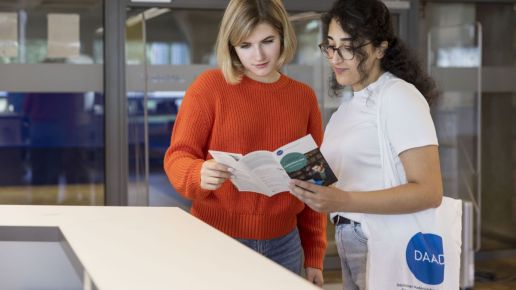
You would like to apply for a DAAD scholarship in Germany? Information and answers to questions about application conditions, requirements and the selection procedure are available here.
- Requirements for scholarship application
- Preparing your application
- Planning your project
- Writing your application
- The selection procedure
- Scholarship benefits
A. Requirements for scholarship application
1. is there an age limit for daad scholarships.
No, there is usually no fixed age limit. There are individual exceptions in programmes in which this is explicitly requested by an international partner. Most scholarship programmes stipulate that only a certain amount of time should have elapsed since the last degree was obtained (see also question 2 ). For details, please refer to the respective Call for Applications at www.funding-guide.de under the heading "Application requirements" .
2. I finished my university degree or started my doctorate longer ago than the application requirements specify. Am I still eligible to apply?
Yes, an application may be permissible under the following circumstances which may have a delaying effect on studies or doctoral projects:
- pregnancy and childbirth
- care of children up to the age of 12 (maximum of three years per child)
- care of care-dependent relatives
- disability or chronic illness
- prolonged, serious illness
- compulsory military service
- if applicable, other circumstances.
The dates of birth of children and periods of childcare or care of relatives or longer periods of absence due to illness or disability should be indicated in the application form; the last free text field "Other comments / Information" is available for this purpose. DAAD reserves the right to ask you to submit appropriate supporting documents.
Please provide proof of disabilities or illnesses in the form of a disability card or medical certificate. If possible, the medical certificate should indicate the periods of absence.
Information about studying abroad with a disability or chronic illness is provided in the following: Mobility with a Disability .
Other circumstances must also be justified and substantiated with supporting documents.
3. I have not completed my university degree by the application deadline. Am I still eligible to apply for a scholarship?
Yes, in programmes which require a first university degree, you can apply in your last year of study. You must then meet all the academic requirements set out in the Call for Applications by the time your funding period begins. Also, you can hand in your degree later; it must be submitted before the start of the funding period.
4. I'm already in Germany. Am I still eligible to apply?
Yes, if you have been in Germany for a maximum of 15 months by the closing date for applications and the Call for Scholarship Applications makes no other specifications.
5. I am not currently living in my country of origin. Am I still eligible to apply for a scholarship?
An application from your current country of residence is possible under certain circumstances:
- If you wish to apply for a short-term scholarship (up to 6 months), you must have lived in your country of residence for at least one year at the time of application and have a residence there.
- If you would like to come to Germany for more than 6 months, you must also have obtained your last degree (e.g. Bachelor / Master ) in your country of residence or obtain this degree until the start of the scholarship.
In any case, you can apply from your country of origin, even if you currently live in another country and meet the above requirements. Your country of origin is usually the country in which you have spent most of your life and may differ from your nationality.
Example: You were born and raised in Albania and have lived in the UK for four years , where you also obtained your Bachelor's degree. It is best to apply from the UK as you have a UK degree. It is possible to apply from Albania as an alternative. - However, you may not apply from both countries at the same time.
We strongly recommend that you seek information and advice to find out which scholarship programmes are available to you. Contact persons are listed in the Scholarship database under "Contact and advice" .
6. I have dual citizenship. From which country should I apply?
Dual nationals must apply from their country of origin (usually the country where you have spent most of your life). If the requirements are met, an application from the current country of residence is also possible, as described above (A5) . Nationality alone does not entitle you to apply from a country you have never lived in and are not currently living in.
Example: You were born and raised in Argentina, currently live there and have Argentinean and Italian citizenship. You can only apply from Argentina. It is not possible to apply from Italy.
7. I am enrolled in a study programme at a German university and aim to complete this degree in Germany, or I am completing a doctoral degree at a German university. Can I apply for a DAAD scholarship for a stay in a country other than Germany?
Under the following conditions, foreign nationals who live in Germany may also apply for a DAAD scholarhip for stays in other countries than Germany.
- You are enrolled in a study programme at a German university with the aim of obtaining a degree from the German university, or
- you are doing your doctorate at a German university
and want do go abroad during this time . This regulation does not apply to international students/ doctoral candidates who are already being funded with an "Incoming DAAD scholarship" in Germany.
In addition, persons of equal status to Germans according to § 8 Para. 1 Number 2ff. Paragraph 2, Paragraph 2a, and Paragraph 3 BAföG can apply. In this context, the wording of the law applies, which can be found here .
Furthermore, it will be checked to what extent there is a connection to Germany and whether there is a justified expectation that you will return to Germany after the end of the temporary stay abroad.
A funding in your home country is usually excluded.
Programmes for funding abroad for students in Germany are listed in our scholarship database www.auslands-stipendien.de .
8. Can I apply for a scholarship whatever subject I am studying?
Principally yes: DAAD offers many scholarship programmes that are open to almost all subjects, although restrictions apply to some subjects (e.g. medicine).
There are also subject-specific programmes that are aimed at very specific subject areas, such as architecture, music or computer science. In the Scholarship database , you can select the scholarships programmes that are offered for your subject group.
9. What language skills do I need to apply for a scholarship?
Not all programmes require a general minimum language level for funding applications. Depending on country of origin and scholarship programme, however, certain language skills may be expected. You can find out which requirements these are in the section "Application requirements" and under "Application documents" of the Call for Applications. Please read these requirements thoroughly to find out what applies to your programme and your country.
If you are awarded the scholarship, the DAAD can provide a preparatory German language course for you. The DAAD scholarship selection committee will assess whether such a German course is necessary for you and how many months (maximum six) are appropriate. These German courses will enable you to improve your German language skills. However, it is not realistic to reach the level required for university admission within the framework of these courses if you have no or only very limited German language skills by then.
In order to apply for a place at a German higher education institution and thus to start your scholarship , you must also submit proof of your language skills (e.g. DSH or TestDaF if the language of instruction is German; e.g. TOEFL or IELTS if the language of instruction is English). Level C1 is often required; however, this varies from degree programme to degree programme. Please contact your chosen host university as early as possible to find out about the requirements you need to meet. You can also find more information about the requirements on our website.
10. My German language skills are not yet sufficient. Are there e-learning language courses that I can take in my home country to improve my skills?
Yes, there are internet offers for learning German . For example, the Goethe-Institut as well as Deutsche-Uni Online (DUO) offer special online courses in German. For scholarship holders whose funding lasts longer than six months, DAAD will pay the costs of one DUO module.
Furthermore, you can find a wide range of free online content for learning German on Deutsche Welle on learngerman.dw.com .
11. I am considering taking a distance / online / part-time course (e.g. dual course of study) in Germany. Am I eligible to apply for a DAAD scholarship?
No, DAAD scholarships are awarded to applicants wishing to complete a full-time course of study with compulsory attendance in Germany. This is why applicants wishing to take a blended learning or distance/e-learning programme or part-time programme (e.g. dual course of study) are not eligible for DAAD funding.
Only in the programme University Winter Courses Online for Foreign Students and Graduates is it currently possible to take part in a language course online.
12. I already have a scholarship from the European Union, the DAAD or another organization in Germany. Can I still receive a DAAD scholarship?
If you are already funded by the DAAD, another German funding organization or another state agency in Germany, you cannot receive a scholarship from the DAAD at the same time.
An Erasmus scholarship is not compatible with a full DAAD scholarship. Scholarship holders in the "University Summer Courses in Germany" and "University Winter Courses in Germany" programmes as well as those who receive a partial scholarship from DAAD can also take advantage of ERASMUS funding.
13. How good do my grades have to be in order for me to receive a DAAD scholarship?
The DAAD primarily supports individuals with high academic achievements. As a rule, the scholarship programmes do not stipulate a minimum grade point average for the application. Academic performance (selection criterion "qualification") is nevertheless an important criterion for the award of the scholarship.
But good grades are not everything: other aspects are also taken into account that are also important, such as the quality of the project, language skills, motivation, extracurricular commitment, special circumstances, etc.
Further information on the selection criteria can be found at Section E .
B. Preparing your application
1. in the call for applications a so-called "letter of motivation" must be submitted. what does this mean.
In a letter of motivation, you are required to describe your professional and personal reasons for your planned project in Germany on at least one and no more than three pages.
A letter of motivation gives you the opportunity to describe your personality and the reasons why you are applying for DAAD funding in your own words. The following information and questions will help you write an informative letter of motivation.
- Studies: study programme, number of semesters , if applicable, degree
- Professional experience, if applicable
- Specialised knowledge, skills and language skills
- Prizes and awards (if applicable)
- Why do you wish to take the study programme or attend the language or specialist course for which you are applying?
- What appeals to you about your chosen university?
- What do you hope to gain from your stay in Germany (personal, professional, for your career)?
- Why are you applying for a DAAD scholarship?
- What do you expect of this scholarship?
- How will the scholarship help you achieve your academic, professional and personal goals?
- Here you can outline special extracurricular achievements and commitments or personal qualities that say something about your character.
2. The calls for applications for research grants require a so-called "proposal". What does this mean?
A proposal is a detailed and precise description of the project you have agreed to complete with your academic supervisor. In a proposal, you define the goals of your research work, reflect upon theoretical and methodical procedures and you describe the individual steps. You have to prepare and formulate the proposal yourself. Taking over proposals from others is a violation of the Rules of Good Academic Practice .
The objective
- What is the subject of your research project?
- Which steps are planned?
- What is the time schedule for your planned research project?
The structure
The proposal (unless otherwise stated in the scholarship announcement, maximum of 10 pages) should contain details about:
- The research field in general and the current state of research literature:
- What is the current state of research?
- Which theories/work of other academics will you draw upon?
- What theoretical framework or scientific models will you use? Explain the reasons why you are drawing on this theory or model. Are there competing theories/models and, if so, why are you not using these in your project?
- What is your research question?
- Key research questions (hypotheses), research objectives and academic relevance of the project:
- What do you intend to find out?
- What goals are you pursuing with your project?
- Research strategies/methods:
- How do you intend answering the research questions?
- How do you want to collect data (document analyses, quantitative or qualitative survey, experiment, etc.)?
- Which academic literature will you use?
- How will you evaluate results?
- What preparation have you already done or intend doing before funding begins?
- Ethical issues/anticipated difficulties related to collecting data
- Research bibliography: List of books and essays upon which your work is based.
Please note that the time plan must be uploaded to the DAAD portal as a separate document.
C. Planning your project
1. do i need contacts in germany when i apply.
If you wish to carry out individual research or complete a doctorate in Germany, you need confirmation from a university teacher that you are being supervised in Germany (see question 2 ). If you are taking part in a structured doctoral programme, proof of existing contacts to a doctoral programme coordinator must be submitted in the form of respective correspondence.
If you wish to take a Master's degree in Germany, all you need to provide is information about your study programmes for which you would like to apply (see "Application procedure" in the Call for Applications).
2. I need a supervisor for my individual project in Germany. Who can be my host?
Hosts can be university teachers or academic teaching staff who work at a state or state-recognised institution of higher education or a non-university research institution in Germany. If possible, the host should have a professorial qualification in an academic field.
These tips on the site Research in Germany will help you find an academic supervisor.
3. I have already found a supervisor for my individual project. What documents do I need from him/her for the application?
You need a "Letter confirming academic supervision" . With this, your academic host confirms their willingness to support you in carrying out your research project or doctorate . You must submit the confirmation of supervision together with your application.
Ideally, the letter of confirmation (informal) from your supervisor
- indicates that the description of your research project and schedule have been discussed,
- confirms that a workplace is available for you, and
- indicates which working language is spoken at the host institute.
4. I am planning to study for a Master's degree in Germany. What do I have to consider when applying for a place at university?
You will have to arrange your application for admission and possible matriculation at the host university yourself. Even a DAAD scholarship is no guarantee that you will get a place at a particular university in Germany. If you do not receive admission to study your scholarship will be forfeited.
It is therefore important that you inform yourself well in advance about the application requirements and deadlines and apply to several universities. When searching, also look for courses offered by universities of Applied sciences (HAW) or smaller universities. This will increase your chances of being admitted.
Information on suitable study programmes can be found, for example, in the database for international programmes or all degree programmes in the Higher Education Compass.
D. Writing your application
1. how do i apply for a daad scholarship.
Application procedures may vary depending on scholarship programme. To find out where and how to apply, please read the "Application procedure" section of the Call for Applications in the Scholarship database ( www.funding-guide.de ). Seek advice if you have any questions.
Contact persons (often in your area) are listed under "Contact and advice" . A list of locations and contact data from the DAAD network is available here .
2. In the Call for Applications it is said that I have to apply through the DAAD portal.
What does this mean.
You have to apply online. To do this, you must register in the DAAD portal. In the scholarship database , first select your chosen scholarship programme and then the tab "Submit application" . Note that this tab is only shown during an ongoing application period. The closing date for applications is indicated in the "Application procedure" tab.
I have technical problems with my online application. What can I do?
If technical problems occur, the portal hotline is available to help you on weekdays from 9 am to midday at (+49) 228/882-8888 or by e-mail at [email protected] .
Which documents do I have to upload to be able to submit an application to the DAAD portal?
Your application is only complete if you submit all the application documents listed in the Call for Applications. Artistic work samples (e.g. audio files) are uploaded via a media databas e – you will receive an upload link as indicated in the Call for Aplication. In some cases, individual documents (e.g. university certificate) may be submitted at a later date if this is explicitly permitted in the programme's Call for Applications.

Do I receive confirmation that my application has been received?
Yes, as soon as you have submitted your application online, you will automatically receive confirmation that your application has been successfully submitted and an e-mail informing you that a message has been sent to you via the portal's messaging system. The message confirms that your application has been received.
3. The Call for Applications states that I have to submit a reference from a university teacher. Who can write a reference for my application?
References in scientific subjects should be written by university teachers with a doctoral degree who can provide information about the following:
- What are your academic achievements?
- What are your academic and personal qualities?
- Is your project well planned, feasible and relevant?
- What significance does the scholarship have for your academic and professional career?
Find out how to generate and submit the reference form in the respective Call for Applications in the Scholarship database ( www.funding-guide.de ).
4. Do I have to apply in German?
Unless otherwise stated in the Call for Applications, you can submit your application either in German or English. Please note that application documents that are not in German or English, e.g. university certificates, must be translated either into German or English. The translations do not have to be certified for the application procedure and you may do the translations yourself.
5. What language certificates do I need when I apply for a scholarship?
You can find out what language certificates you need when you apply for a scholarship in the "Application procedure" section of the Call for Applications.
When submitting your scholarship application to the DAAD you must provide proof of your current level of proficiency in the language of instruction ( German, English or German and English ) of your chosen degree programme.
As a rule, the following certificates can be considered as language certificates for German :
- German Language Diploma of the Standing Conference of the Ministers of Education and Cultural Affairs of the Länder in the Federal Republic of Germany (DSD),
- Goethe-Zertifikat ,
- Austrian Language Diploma as well as
- telc Deutsch and
- onSET Deutsch .
The following certificates, for example, can be submitted as proof of English language proficiency:
- Cambridge English,
- Cambridge Business,
- TOEFL Essentials,
- TOEIC as well as
- PTE Academic and
- An onSET test can be taken in many countries, e.g. with a DAAD Lecturer. Please also take a look at "Contact and Advice" .
6. I obtained a German Language Diploma II (DSD II) more than two years ago. Do I still have to submit a language certificate for German?
In this case, a simple placement test (e.g. a free online test) is a sufficient proof of your current language skills.
7. Do my certificates and transcripts (lists of grades) have to be certified for my application?
No, not initially. DAAD reserves the right to request certified documents after a positive selection decision has been made.
E. The selection procedure
1. who makes a decision about my application.
Scholarship applications are reviewed by an independent and voluntary selection committee. This may be made up of local and/or German university teachers, researchers and DAAD Lecturers. Depending on scholarship programme and the local situation, the best applicants may also be required to introduce themselves personally. This can take place either on site, face-to-face, or virtually.
Depending on programme, the selection decision is made either by the local selection committee directly or – in the case of a two-stage selection procedure – by another independent committee of academics in Germany. DAAD staff are not entitled to vote in the scholarship selection procedure.
2. Will I be given the names of the professors involved in the selection?
No. In order to maintain the independence of our volunteer selection committee members, we must ensure that they can make their assessments without any influence or bias. For this reason, like other funding institutions, we refrain from disclosing the composition of the individual commissions and the names of any additional experts who may have been consulted.
At the same time, strict bias regulations apply to the selection experts: To avoid conflicts of interest/bias, experts are not allowed to evaluate applications from the university’s own faculty or examine applicants with whom they have a personal (supervisory) relationship.
3. According to which criteria does the selection committee make its decision?
The key selection criteria are:
Professional qualification
- Academic achievements (grade point average, development of grades)
- Academic progress
- Knowledge of the language(s) of instruction or working language(s)
- Academic performance (general grade point average, grade development)
- School-leaving certificate, if applicable
- Course of studies
- Knowledge of the language of instruction or working language
- If applicable, relevant internships, work experience
Quality of the study or research project
Study project:
- Quality of the study project and of the preparation (preliminary information, choice of degree programme, host university and establishment of contacts)
- Integration of the project into the academic career path
- Quality of the study project as well as the preparation (preliminary information, choice of study programme, host university and establishment of contacts)
Research project:
- Quality of research proposal and preparation (originality, topicality and relevance of the project, choice of host institution and first contacts)
- Feasibility and consistency of study plan and schedule
- Incorporation of project within the overall doctorate (in terms of content and time), if relevant
- Quality of the research project as well as the preparation (originality, topicality and relevance of the project, choice of host institution and establishment of contacts).
- Feasibility and consistency of the work plan and timetable (analysis and evaluation steps)
- Embedding of the project in the overall doctoral project (in terms of content/time), if relevant
Potential of the applicant
- Motivation: academic and personal reasons for the stay in Germany, German language skills (if different from the working language);
- Prospects: Significance of the stay in Germany for further academic, professional and personal development.
- Extracurricular commitment: extracurricular knowledge and skills, social commitment.
- Motivation: professional and personal reasons for the stay in Germany, German language skills (if different from the working language);
- Perspectives: Importance of the stay in Germany for further academic, professional and personal development
In addition, in order to ensure equal opportunities, the selection committee may take into account special circumstances, which you can state in the application form. Examples of "special circumstances" are
- disability,
- chronic or prolonged illness,
- raising children,
- caring for relatives,
- extensive employment required to finance studies.
In these or comparable cases, disadvantages will be compensated for when assessing the application.
Depending on scholarship programme, additional selection criteria may be relevant, e.g. language skills. To find out what applies to your programme, read the Call for Applications in the Scholarship database ( www.funding-guide.de ).
F. Scholarship benefits
1. how much scholarship money is paid a month.
The scholarship payment depends on the academic qualifications of the scholarship holders and on the scholarship programme. Scholars taking a Master's programme typically receive EUR 934 , doctoral candidates and postdocs EUR 1,300 . Rates for university teachers are usually EUR 2,000 for assistant teachers , assistant professors and lecturers , EUR 2,150 for professors .
You can find an overview of other possible benefits in each programme's Call for Applications in the Scholarship database ( www.funding-guide.de ).
2. Who pays for outward and return travel expenses?
DAAD grants an allowance towards travel expenses in the form of a lump sum. You can find more information on the travel allowance in the respective Call for Applications the Scholarship database .
3. Are there additional benefits for family members?
Under certain conditions, DAAD offers an allowance for accompanying spouses, child allowance and insurance benefits for spouses, registered partners and children ("marital allowance"). For scholarship holders with a funding period of over six months, please read the Call for Applications in the Scholarship database ( www.funding-guide.de ) to find out if a programme provides for family members. If the funding period is less than 6 months, no family benefits will be granted.
The "marital allowance" is 276 euros per month . If you are not entitled to state child benefit, you can apply for a DAAD child allowance in the amount of the state child benefit. Currently, you receive 250 euros per month per child . Information on state child benefit can be found here .
4. Do I have to take out health insurance in Germany and does DAAD contribute towards this?
Scholarship holders and accompanying family members must be covered by health insurance from the first day of their stay in Germany. In many programmes, insurance coverage is part of the scholarship. As a rule, the DAAD then takes out health insurance for the scholarship holder as part of the scholarship and pays the premiums. Please read the "Scholarship benefits" section of the Call for Applications in the Scholarship database ( www.funding-guide.de ).
If your chosen programme does not include insurance coverage, under certain circumstances you may be able to take out inexpensive health, accident and personal liability insurance through DAAD at your own expense.
If you have any more questions, contact DAAD's insurance office: [email protected] or +49-228-8828770.
5. Am I allowed to take on a part-time job as a scholarship holder in Germany?
Scholarship holders wishing to work part-time during their scholarship period, i.e. pursue gainful employment or an unpaid internship , always require the approval of DAAD. It is necessary that your academic supervisor or course coordinator must also give their consent.
DAAD will verify that the part-time employment does not interfere with the purpose of the scholarship. Additional income exceeding EUR 520 gross per month shall be deducted from the monthly scholarship payment.
6. I am receiving a second scholarship from provider in my home country. How does this impact my DAAD scholarship?
A second scholarship from an international provider of up to EUR 520 will not have an effect on your DAAD scholarship. If the second scholarship exceeds this amount, the excess amount shall be deducted from the DAAD scholarship.
A scholarship form another German funding organisation or another state agency in Germany may not be used at the same time as a DAAD scholarship (see also question A.11 ).
7. Some universities in Germany charge tuition fees. Do I have to pay these fees if I'm receiving a DAAD scholarship?
Yes. DAAD does not pay tuition fees for its scholarship holders. Even as a scholarship holder, you should therefore ask your chosen host university whether tuition fees are charged for your programme.
Although tuition fees are not generally charged in Germany, studying at some locations is not always free. In the federal state of Baden-Württemberg , international students from non-EU/EEA countries ( Bachelor and Master's level ) at state universities have to pay a fee of EUR 1,500 per semester.
Private universities in all federal states may also charge tuition fees. These can vary. Both state and private universities in all federal states may also charge fees for so-called " weiterbildende Masterstudiengänge " (non-consecutive Master's degrees), that often require previous professional experience or lead to a specific additional qualification. These include, for example, the so-called LL.M degree programmes for law students. Fees for these programmes are sometimes very high so you should find out about them in advance.
8. Are there additional scholarship benefits for people with a disability or chronic illness?
Yes, in such cases you can apply for additional benefits which individually supplement the regular scholarship benefits. To do so, please contact the relevant contact person at DAAD following the scholarship selection procedure.
Please note: It is not necessary to specify your disability or chronic illness on the application form but under certain circumstances it may be helpful, for example if your disability negatively impacted your studies or academic achievements and this should be taken into account in the selection procedure. For more details, go to Mobility with a disability .
9. In my scholarship programme, a monthly rent subsidy may be granted if applicable. What are the requirements and what is the amount of the rent subsidy?
If you are in Germany alone, without accompanying children or spouse/registered partner , and are studying or researching in a place with particularly expensive rents (rent levels III to VII), you may be able to receive a monthly rent subsidy of a maximum of EUR 350 . Whether the application is approved depends, among other things, on what portion of your scholarship you have to spend on rent and whether the accommodation is customary in the locality and appropriate. The amount of the rent subsidy depends, among other things, on the amount of the warm rent for your accommodation.
If you live together with your family (spouse or registered partner and/or children) in a flat in Germany, you can apply for a rent subsidy in any place in Germany. In this case, too, we will first check what share of your scholarship you have to spend on rent and whether the accommodation is customary in the locality and appropriate.
Deutscher Akademischer Austauschdienst e.V. Kennedyallee 50 53175 Bonn
All addresses in the DAAD Network
DAAD Newsletters
Receive regular up-to-date information about our work and organisation.
Newsletter - DAAD
Useful Links
- Find Scholarships
- DAAD offices worldwide
Jump to top of page
List of Germany Scholarships, Grants, and Fellowships for International Students
Daad helmut-schmidt masters scholarships for public policy and good governance.
Deadline: 31 July 2024 (annual) Study in: Germany Next course starts Sept/Oct 2025
- Germany Tuition Free Universities and Scholarships for International Students
©iStock.com/cofkocof
Germany has become a popular destination for foreign students looking for an international education. German Universities offers internationally recognized programs at a relatively cheaper cost compared to UK, USA or Australia. Moreover, there are a significant number of available scholarships that allows foreign students to study in Germany for free .
DAAD Scholarships in Germany for Development-Related Postgraduate Courses
Deadline: Aug-Oct 2024 (annual) Study in: Germany Next course starts AY 2025/2026
Heinrich Boll Scholarships in Germany for International Students
Deadline: 1 Mar/1 Sep (annual) Study in: Germany Next course starts 2024
The Deutschlandstipendium at German Universities
Deadline: University-dependent (Annual) Study in: Germany Course starts 2024
KAAD Scholarships in Germany for Developing Countries
Deadline: 15 Jan/30 Jun (annual) Study in: Germany Course starts 2024
Friedrich Naumann Foundation Scholarship for International Students
Deadline: 31 Oct/30 Apr (Annual) Study in: Germany, Switzerland Course starts April/Oct 2024
Rosa Luxemburg Stiftung Scholarships for International Students
Deadline: 1 Oct/1 April (Annual) Study in: Germany Course starts April/Oct 2022
Friedrich Ebert Stiftung Scholarships
Deadline: 31 May/30 Nov (Annual) Study in: Germany Course starts 2024/25
DRD Scholarships for Sub-Saharan Africans
Deadline: 20 June 2021 (annual) Study in: South Africa/Germany Course starts Jan-May 2022
Konrad-Adenauer-Stiftung Scholarships in Germany for International Students
Deadline: 15 July (annual) Study in: Germany Course starts 2024
- 10 Distance Learning Scholarships & Tuition Free Online Degree/Courses
- Top 10 Scholarships in Italy for International Students
- 35+ International Scholarships for Development-Related Studies
- Top 10 Prestigious Scholarships for the Best International Students
- Top 15 International Scholarships for Developing Country Students
- 20+ Tuition Scholarships offered by Universities for International Students
- Top 10 Scholarships for Study in Any Country or Anywhere
- Top 25 Foreign Government Scholarships for International Students
- 10+ Scholarships in Australia for International Students
- Top 10 Scholarships in New Zealand for International Students
- Top 75 International Scholarships to Watch out for in 2024
Home | About | Contact | Sitemap | Terms of Use | Privacy Policy | Copyright
Scholarships for international degree students and doctoral candidates
As an international student, you are eligible for several scholarships and funding opportunities throughout the State of Bavaria and Germany. You can also count on the support of institutions like the Munich Student Union.
Skip to content
Scholarships and support for full-time students and doctoral candidates, scholarships for university admission, scholarship databases, further information for financing your studies.
The Study Scholarship, available by application to LMU's International Office, is funded by the Federal State of Bavaria for international students and doctoral students at LMU who are registered at the time of application for regular full-time study programs.
The requirements for the scholarship include academic excellence, demonstrable knowledge in the applicant’s field of study, and financial need .
Application deadline: 15 January – 28 February 2024
- Application requirements (PDF, 2,245 KB)
- Application form
- Declaration of financial need (PDF, 1,337 KB)
- Reference (PDF, 141 KB)
Contact: Maj-Catherine Botheroyd-Hobohm
Phone: +49 89 2180-9727 Email: [email protected]
This semester-long scholarship, available by application to LMU's International Office and funded by the German Academic Exchange Service (DAAD), is for international students and doctoral students at LMU who are registered at the time of application for regular full-time study programs with a history of academic excellence .
Applicants must earn their first academic degree at LMU within one year and provide evidence for their financial need .
- Application requirements (PDF, 225 KB)
International students and doctoral candidates at the LMU, who find themselves in short-term and unexpected financial need, can apply for one-time financial assistance (650 euros), funded by the State of Bavaria, at the International Office at LMU.
Application deadline for the summer semester 2024 and the winter semester 2024/25: 30 November 2024 A consultation of Mrs Botheroyd-Hobohm at the International Office is required prior to submission of the application on the online-portal.
- Application requirements (PDF, 183 KB)
This semester-long scholarship, available by application to LMU's International Office and funded by the German Academic Exchange Service (DAAD), is offered to international students and doctoral students at LMU who are registered at the time of application for regular full-time study programs with a history of academic excellence.
Applicants must provide a proof of impairment. For example: disability, chronic illness and /or have a refugee background as well as evidence of their financial need.
Application deadline: 01.03.2024 - 30.09.2024
- Application requirements (PDF, 215 KB)
For the application you need the following documents:
Contact: Maj-Catherine Botheroyd-Hobohm Phone: +49 89 2180-9727 Email: [email protected]
This scholarship is for fluent speakers of German only. Please see the German website .
You already completed a German Language Course successfully, however need another one to feel more comfortable to communicate in German, but don’t have the financial possibilities? Then you can apply for funding of max. 150 Euro after you successfully joined the course (max. 80% attendance).
Application period: 15 January - 30 November 2023
- Online application
- Excluded from the application are: students who are German nationals, who have taken their Abitur (higher education entrance qualification) or have gained a German university degree in the Federal Republic of Germany (or in a German school in a foreign country), also Exchange/Program students.
Contact: Maj-Catherine Botheroyd-Hobohm [email protected]
The Oskar Karl Forster Scholarship is open to all students and doctoral candidates of LMU Munich.
Please visit the website of the University Women's Representative to find out more about the funding and mentoring schemes for female students and scholars as well as parents.
More scholarships for degree students
- Germany Scholarship (Deutschlandstipendium)
More scholarships for doctoral candidates
- STIBET Mentoring Scholarship Program
- LMU Completion Grant
- LMU Travel Grant
- External Funding
- BayBIDS-Stipendium
- Professional development scholarship
- DAAD scholarship database
- Federal Ministry of Education and Research (BMBF) scholarship database
- Bavarian University Centers
- Foundations: Association of German Foundations
- Scholarships for gifted students (Begabtenförderungswerke)
- Elite Network of Bavaria
- Federal student loans (BAföG)
- Education loan (Bildungskredit)
- Study completion loan (Studienabschlussdarlehen)
- Financial aid for young South Tyroleans abroad
- Proofreading for international students
- Job exchange
- Munich Student Union
- LMU Faculties
- LMU Scholarship Office
- SIST LMU Scholarships & "Nothilfe"
- To share copy Link
- Share on Facebook
- Share on Twitter
- Share on LinkedIn
What are you looking for?
- main website
- all LMU sites
More information about Google data transfer in LMU's Privacy Policy.
Fully Funded Scholarships in Germany for International Students
Great News! Now you can study in Germany for free with fully funded scholarships. Here are the latest Top 20 Fully or Partially Funded Scholarships in Germany for 2024 - 2025 . With these scholarships, one can study and live in Germany at no cost. If you are looking for Masters, PhD, or undergraduate scholarships in Germany (with or without IELTS requirements) and meet some basic criteria for admission to universities in Germany, you can apply for the following scholarships. One way that international students can help finance their studies in Germany is through scholarships, which are non-repayable financial awards. They are often awarded to students with outstanding academic achievements, although some also recognize volunteer and work experience. Germany is renowned for its state-of-the-art infrastructure, highly qualified professors, and excellent research opportunities, attracting students globally to pursue higher education. For international students, the financial burden of studying abroad, with tuition fees in foreign currency, can be significant. Fully funded scholarships offer a viable solution to this challenge, providing substantial financial support to international students. These scholarships not only cover tuition fees but also often include living expenses, enabling students to focus fully on their studies and research without financial worries. In 2024, a diverse range of fully funded scholarships are available, supporting students from various countries to achieve their academic goals in Germany. Studying in Germany can be quite expensive; therefore, you may apply for fully funded scholarships in Germany, as well as for partially funded scholarships and tuition fee waivers at institution and universities inGermany. You will be able to work on a student visa and manage other expenses.
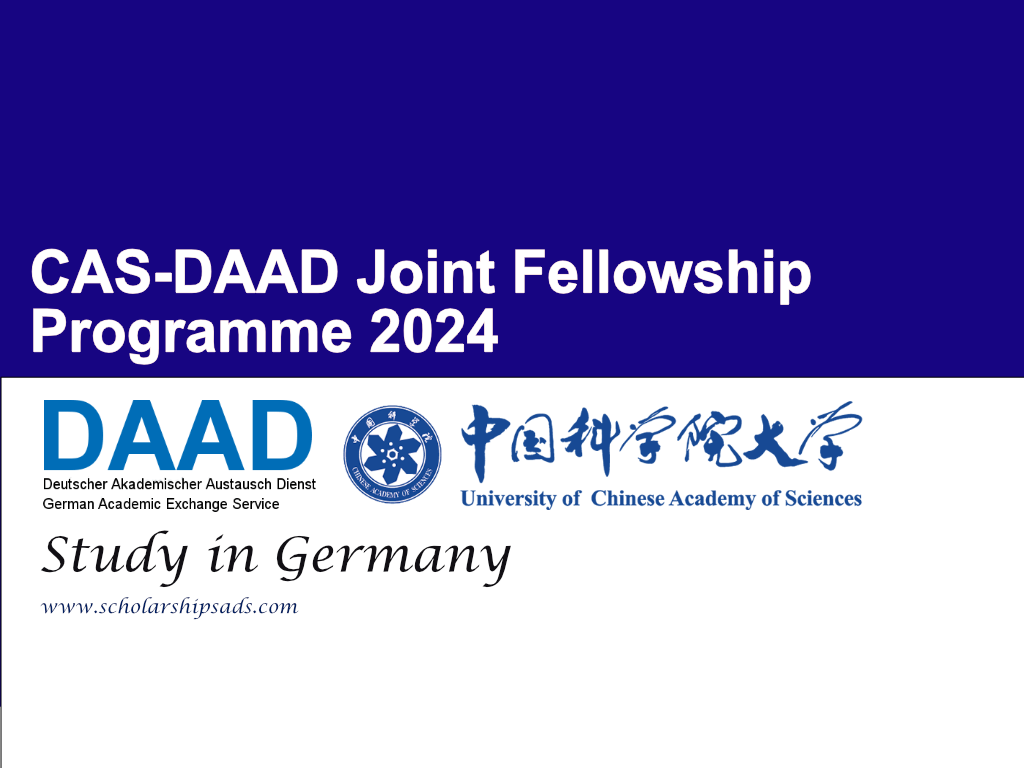
CAS-DAAD Joint Fellowship Programme 2024 in Germany
- Partial Funding
- Germany Universities
- All Subjects
- International Students from China
CAS-DAAD Joint Fellowship Programme 2024 in Germany is a Partial Funding scholarship in Germany offered by Germany Universities Germany . International Students are eligible to apply and receive a scholarship for PhD in CAS-DAAD Joint Fellowship Programme 2024 in Germany . International students are required to comply with the admission criteria as per Germany Universities's admission rules and then apply for CAS-DAAD Joint Fellowship Programme 2024 in Germany.
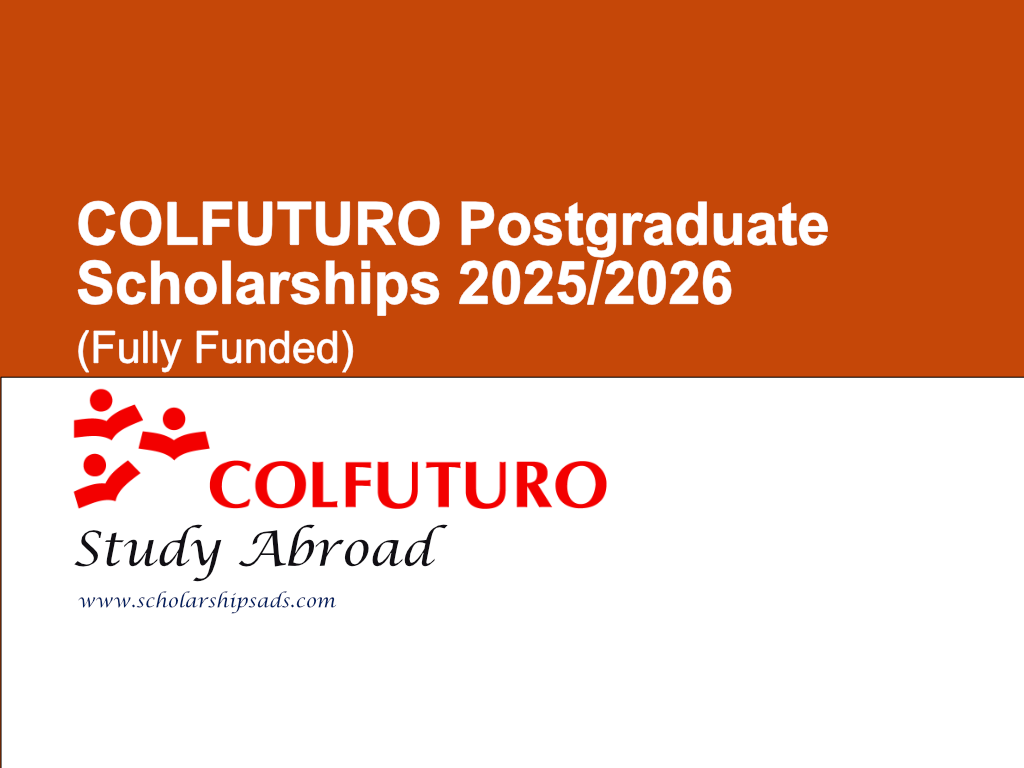
COLFUTURO Postgraduate Scholarships 2025/2026 (Fully Funded)
- Fully Funded, Partial Funding
- Offered by Foundation for the Future of Colombia
- Postgraduate
- International Students from Colombia
- UK, USA, Europe, Germany, Australia, Canada +10 More , Colombia, Spain, Finland, Ireland, Iceland, Italy, New Zealand, Singapore, Switzerland, Sweden
COLFUTURO Postgraduate Scholarships 2025/2026 (Fully Funded) is a Fully Funded, Partial Funding scholarship in UK, USA, Europe, Germany, Australia, Canada, Colombia, Spain, Finland, Ireland, Iceland, Italy, New Zealand, Singapore, Switzerland, Sweden offered by UK, USA, Europe, Germany, Australia, Canada, Colombia, Spain, Finland, Ireland, Iceland, Italy, New Zealand, Singapore, Switzerland, Sweden . International Students are eligible to apply and receive a scholarship for Postgraduate in COLFUTURO Postgraduate Scholarships 2025/2026 (Fully Funded) . International students are required to comply with the admission criteria as per 's admission rules and then apply for COLFUTURO Postgraduate Scholarships 2025/2026 (Fully Funded).
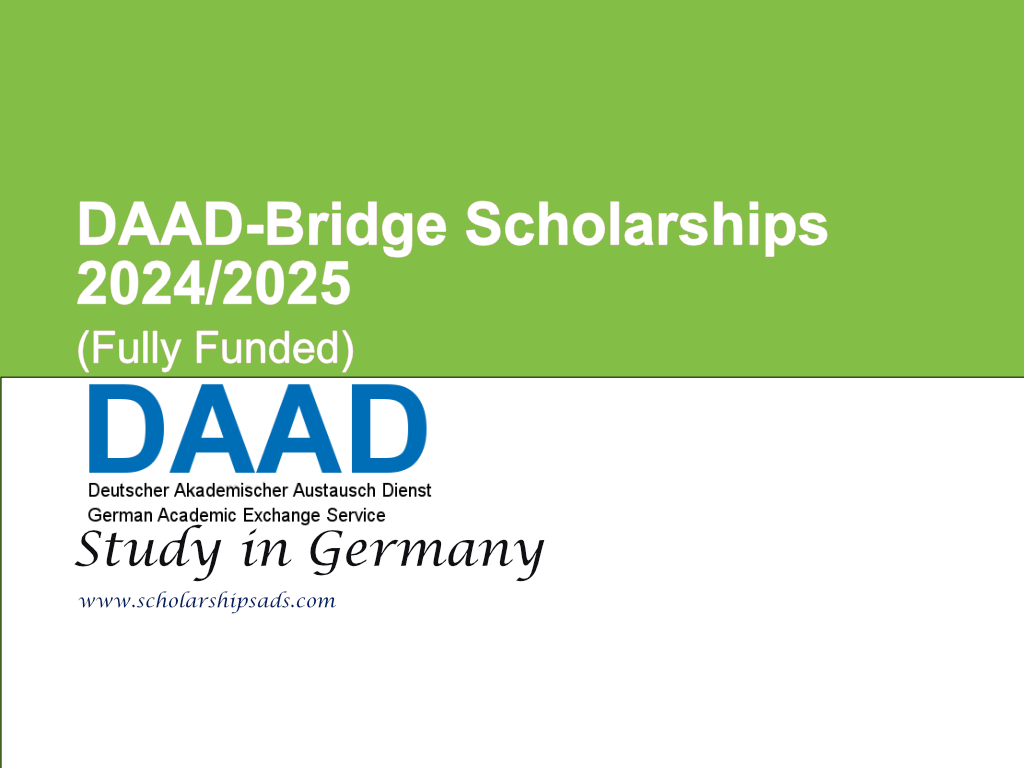
DAAD-Bridge Scholarships 2024/2025 in Germany (Fully Funded)
- Fully Funded
- PhD, Research
- International Students from Iran
DAAD-Bridge Scholarships 2024/2025 in Germany (Fully Funded) is a Fully Funded scholarship in Germany offered by Germany Universities Germany . International Students are eligible to apply and receive a scholarship for PhD, Research in DAAD-Bridge Scholarships 2024/2025 in Germany (Fully Funded) . International students are required to comply with the admission criteria as per Germany Universities's admission rules and then apply for DAAD-Bridge Scholarships 2024/2025 in Germany (Fully Funded).
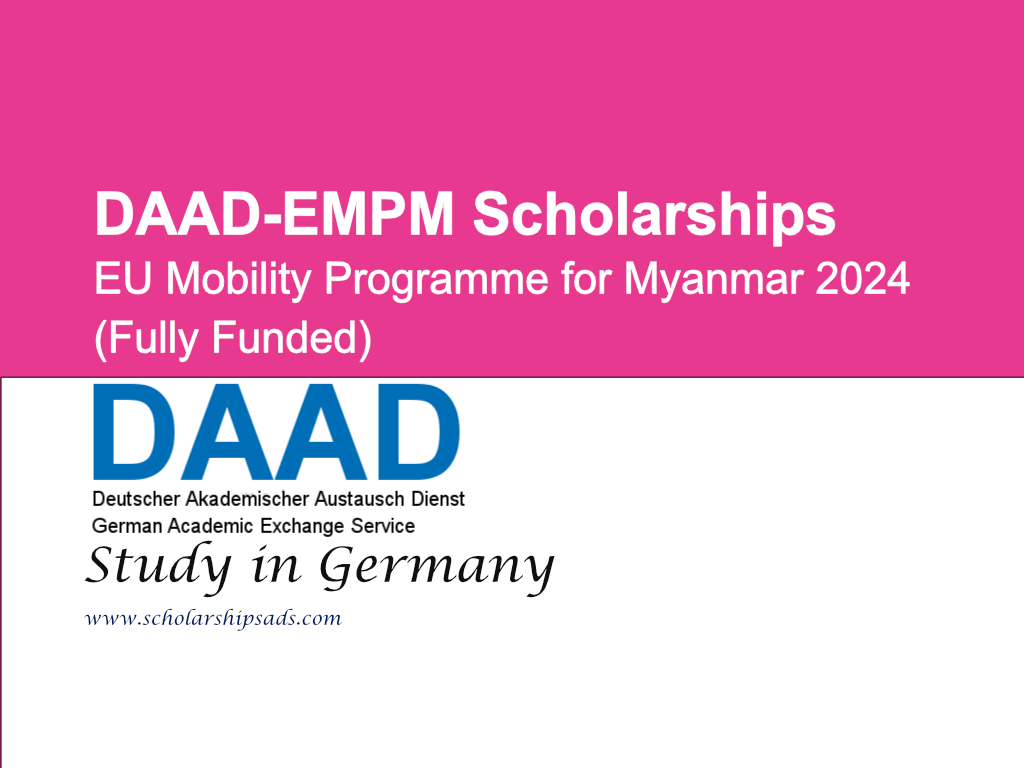
DAAD-EMPM Scholarship 2024 in Germany (Fully Funded)
- Masters, Bachelor
- International Students
DAAD-EMPM Scholarship 2024 in Germany (Fully Funded) is a Fully Funded scholarship in Germany offered by Germany Universities Germany . International Students are eligible to apply and receive a scholarship for Masters, Bachelor in DAAD-EMPM Scholarship 2024 in Germany (Fully Funded) . International students are required to comply with the admission criteria as per Germany Universities's admission rules and then apply for DAAD-EMPM Scholarship 2024 in Germany (Fully Funded).
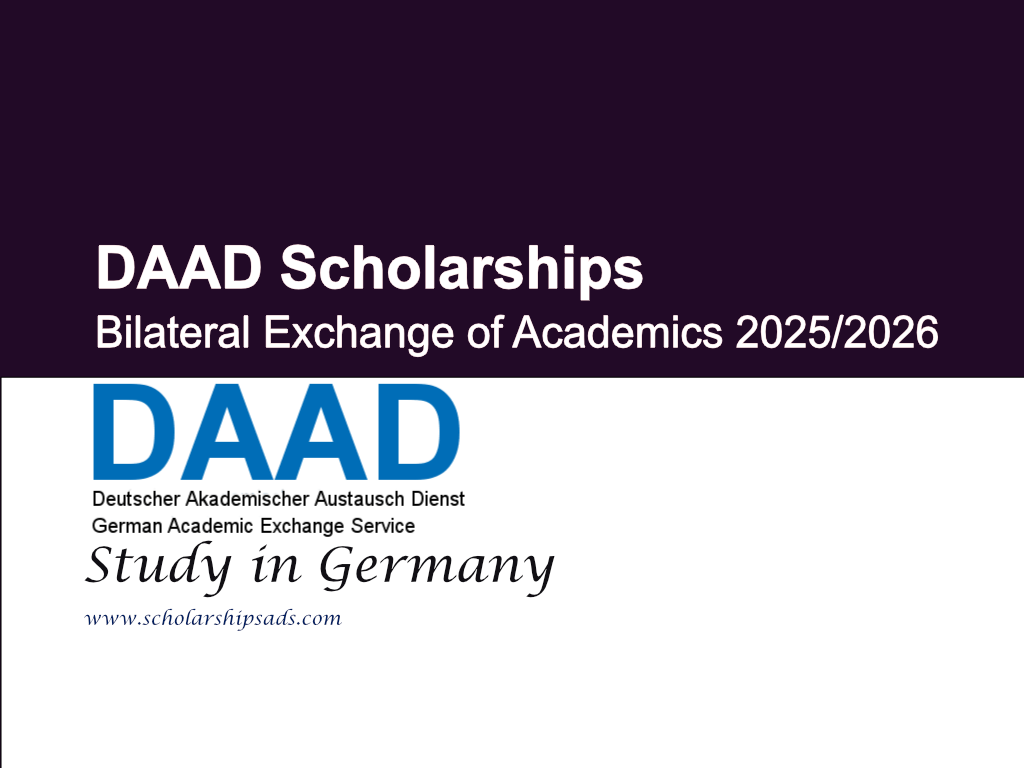
DAAD Scholarships Bilateral Exchange of Academics 2025/2026 in Germany
- Post Doctorate, Research
DAAD Scholarships Bilateral Exchange of Academics 2025/2026 in Germany is a Partial Funding scholarship in Germany offered by Germany Universities Germany . International Students are eligible to apply and receive a scholarship for Post Doctorate, Research in DAAD Scholarships Bilateral Exchange of Academics 2025/2026 in Germany . International students are required to comply with the admission criteria as per Germany Universities's admission rules and then apply for DAAD Scholarships Bilateral Exchange of Academics 2025/2026 in Germany.
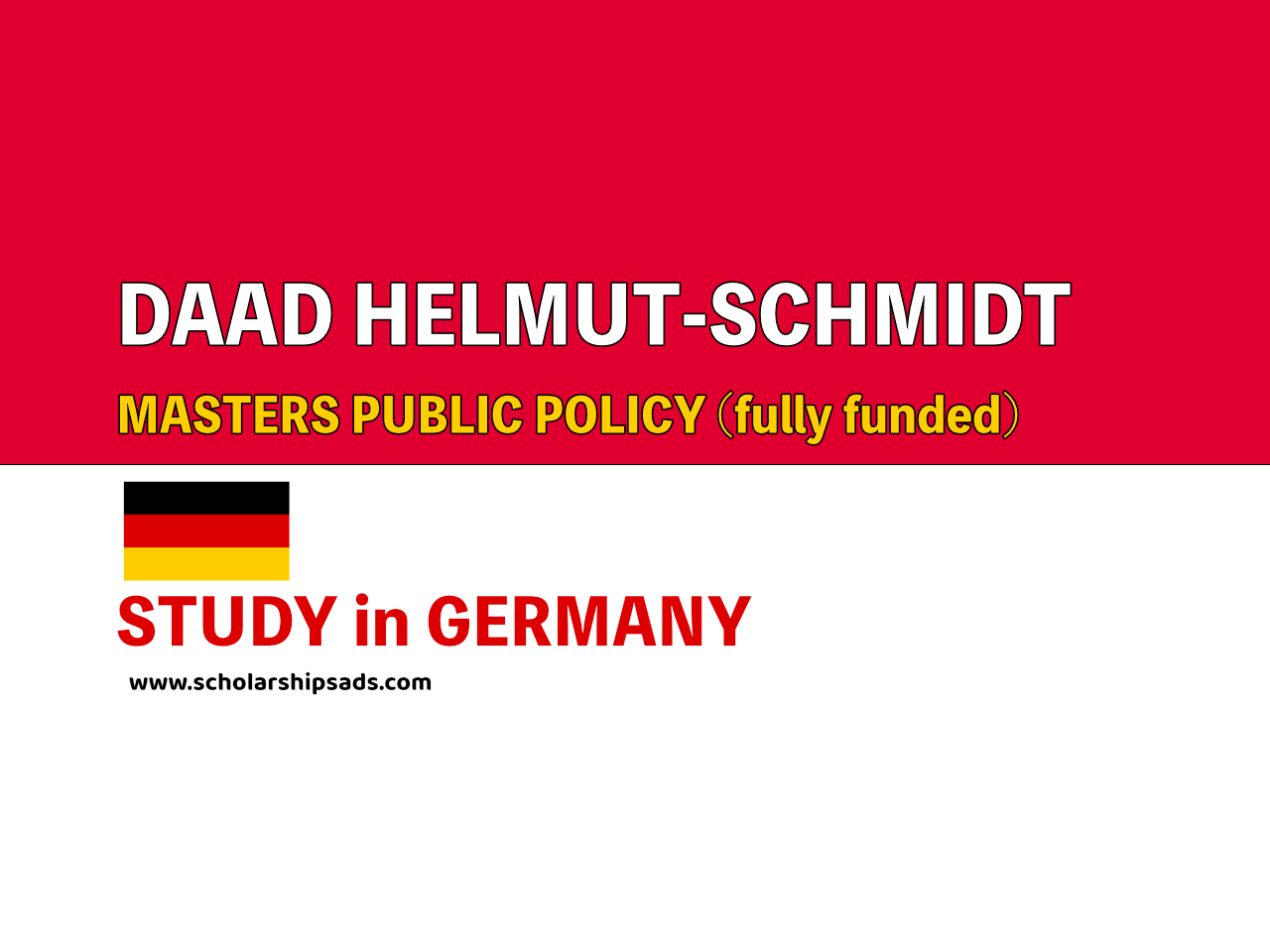
DAAD Helmut-Schmidt-Program for Master’s Scholarships in Germany (Fully Funded)
- Public Policy, Good Governance
DAAD Helmut-Schmidt-Program for Master’s Scholarships in Germany (Fully Funded) is a Fully Funded scholarship in Germany offered by Germany . International Students are eligible to apply and receive a scholarship for Masters in DAAD Helmut-Schmidt-Program for Master’s Scholarships in Germany (Fully Funded) . International students are required to comply with the admission criteria as per 's admission rules and then apply for DAAD Helmut-Schmidt-Program for Master’s Scholarships in Germany (Fully Funded).
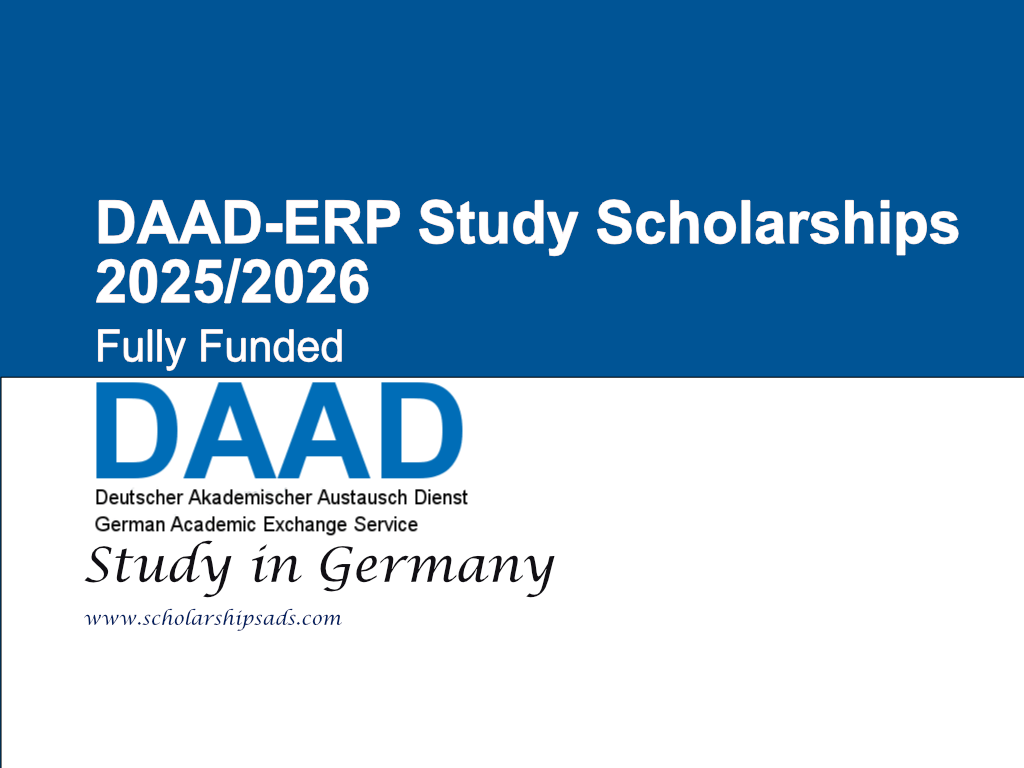
DAAD-ERP Study Scholarships 2025/2026 in Germany (Fully Funded)
- Economics, Business Administration
DAAD-ERP Study Scholarships 2025/2026 in Germany (Fully Funded) is a Fully Funded scholarship in Germany offered by Germany Universities Germany . International Students are eligible to apply and receive a scholarship for Masters in DAAD-ERP Study Scholarships 2025/2026 in Germany (Fully Funded) . International students are required to comply with the admission criteria as per Germany Universities's admission rules and then apply for DAAD-ERP Study Scholarships 2025/2026 in Germany (Fully Funded).
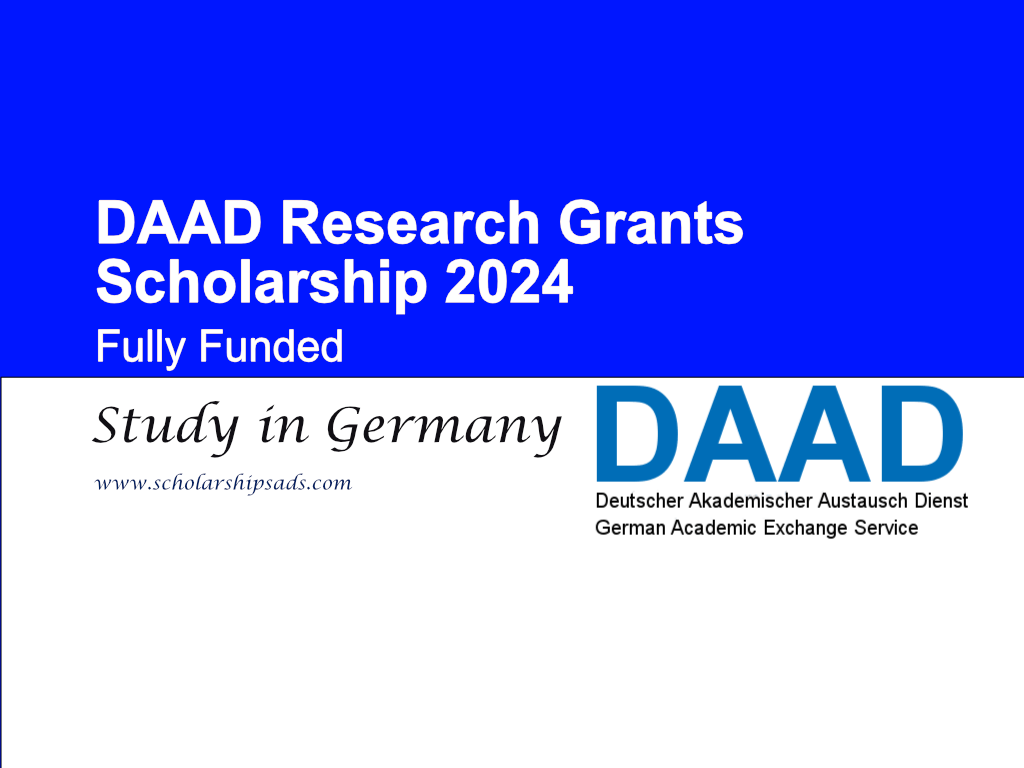
DAAD Research Grants Scholarship 2024 in Germany (Fully Funded)
DAAD Research Grants Scholarship 2024 in Germany (Fully Funded) is a Fully Funded scholarship in Germany offered by Germany Universities Germany . International Students are eligible to apply and receive a scholarship for PhD in DAAD Research Grants Scholarship 2024 in Germany (Fully Funded) . International students are required to comply with the admission criteria as per Germany Universities's admission rules and then apply for DAAD Research Grants Scholarship 2024 in Germany (Fully Funded).
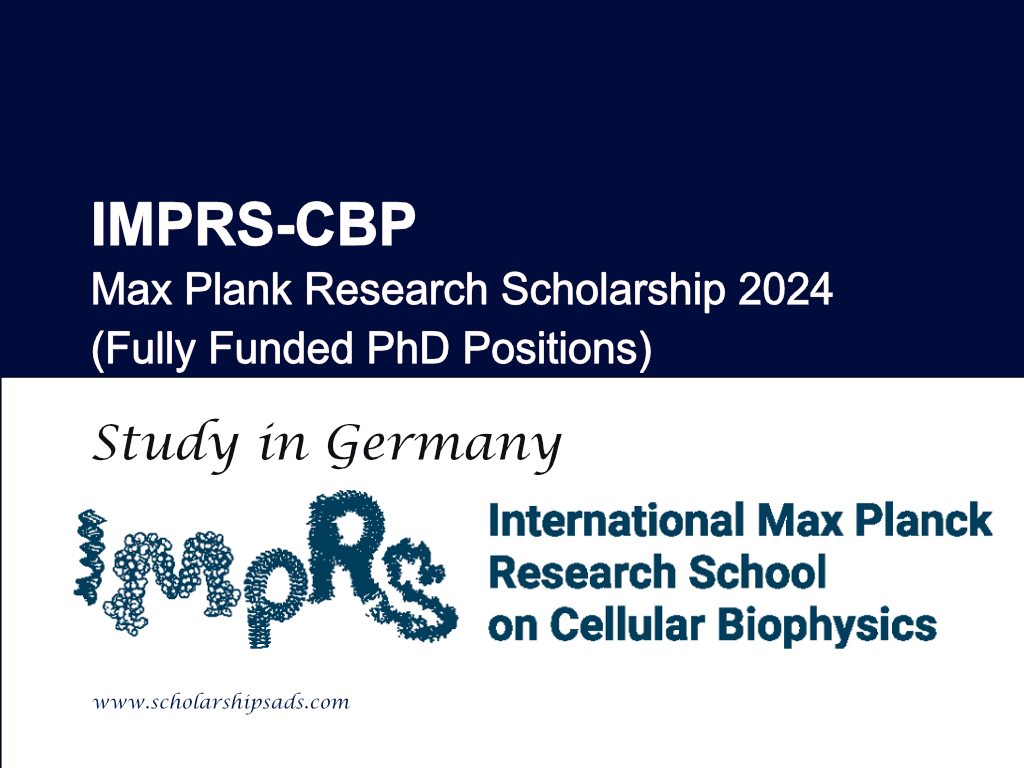
IMPRS-CBP Max Plank Research Scholarship 2024 in Germany (Fully Funded)
- International Max Planck Research School on Cellular Biophysics (IMPRS-CBP)
- Cellular Biophysics
IMPRS-CBP Max Plank Research Scholarship 2024 in Germany (Fully Funded) is a Fully Funded scholarship in Germany offered by International Max Planck Research School on Cellular Biophysics (IMPRS-CBP) Germany . International Students are eligible to apply and receive a scholarship for PhD in IMPRS-CBP Max Plank Research Scholarship 2024 in Germany (Fully Funded) . International students are required to comply with the admission criteria as per International Max Planck Research School on Cellular Biophysics (IMPRS-CBP)'s admission rules and then apply for IMPRS-CBP Max Plank Research Scholarship 2024 in Germany (Fully Funded).
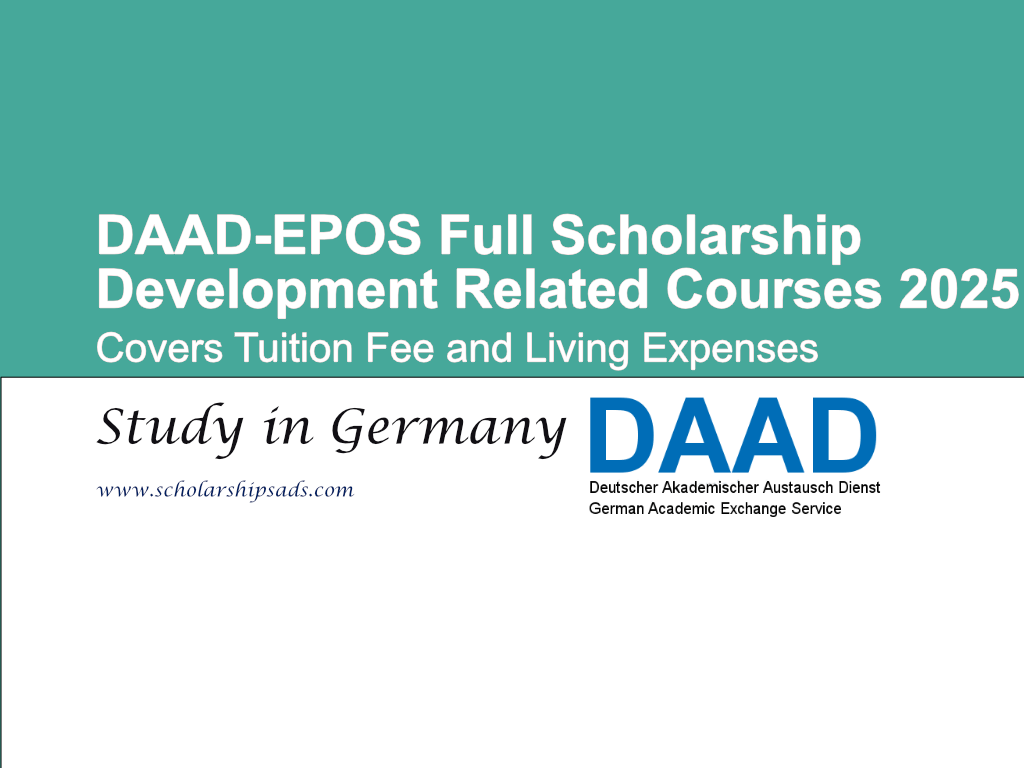
DAAD Scholarships in Germany 2025-2026 (Fully Funded)
- Masters, PhD
DAAD Scholarships in Germany 2025-2026 (Fully Funded) is a Fully Funded scholarship in Germany offered by Germany Universities Germany . International Students are eligible to apply and receive a scholarship for Masters, PhD in DAAD Scholarships in Germany 2025-2026 (Fully Funded) . International students are required to comply with the admission criteria as per Germany Universities's admission rules and then apply for DAAD Scholarships in Germany 2025-2026 (Fully Funded).
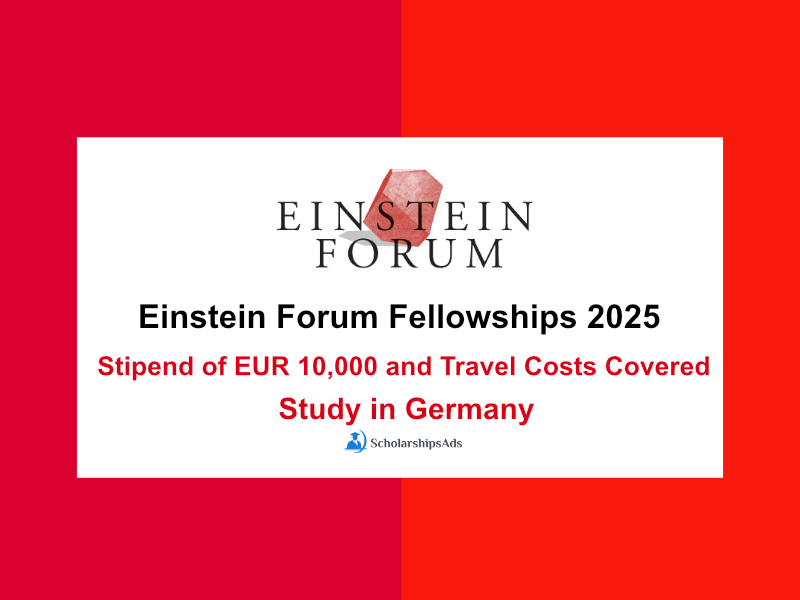
Einstein Forum Fellowships 2025 in Germany
- Social Sciences, Natural Sciences, Humanities
Einstein Forum Fellowships 2025 in Germany is a Partial Funding scholarship in Germany offered by Germany Universities Germany . International Students are eligible to apply and receive a scholarship for Fellowship in Einstein Forum Fellowships 2025 in Germany . International students are required to comply with the admission criteria as per Germany Universities's admission rules and then apply for Einstein Forum Fellowships 2025 in Germany.
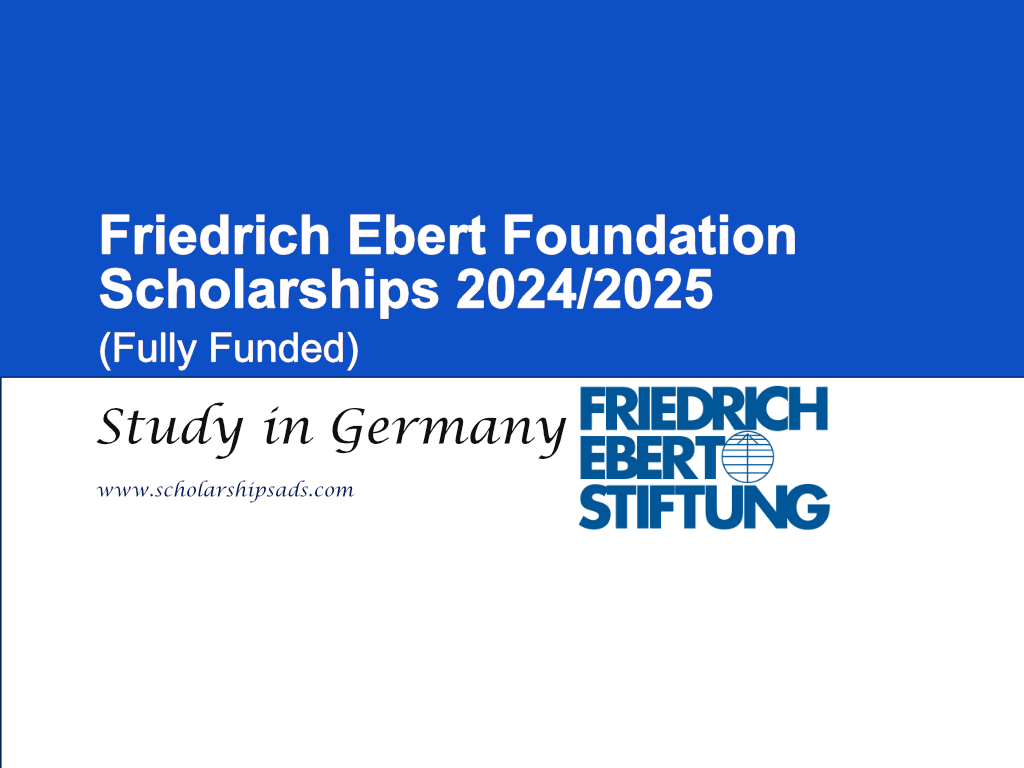
Friedrich Ebert Foundation Scholarships 2024/2025 in Germany (Fully Funded)
- Bachelor, Masters, PhD
Friedrich Ebert Foundation Scholarships 2024/2025 in Germany (Fully Funded) is a Fully Funded scholarship in Germany offered by Germany Universities Germany . International Students are eligible to apply and receive a scholarship for Bachelor, Masters, PhD in Friedrich Ebert Foundation Scholarships 2024/2025 in Germany (Fully Funded) . International students are required to comply with the admission criteria as per Germany Universities's admission rules and then apply for Friedrich Ebert Foundation Scholarships 2024/2025 in Germany (Fully Funded).
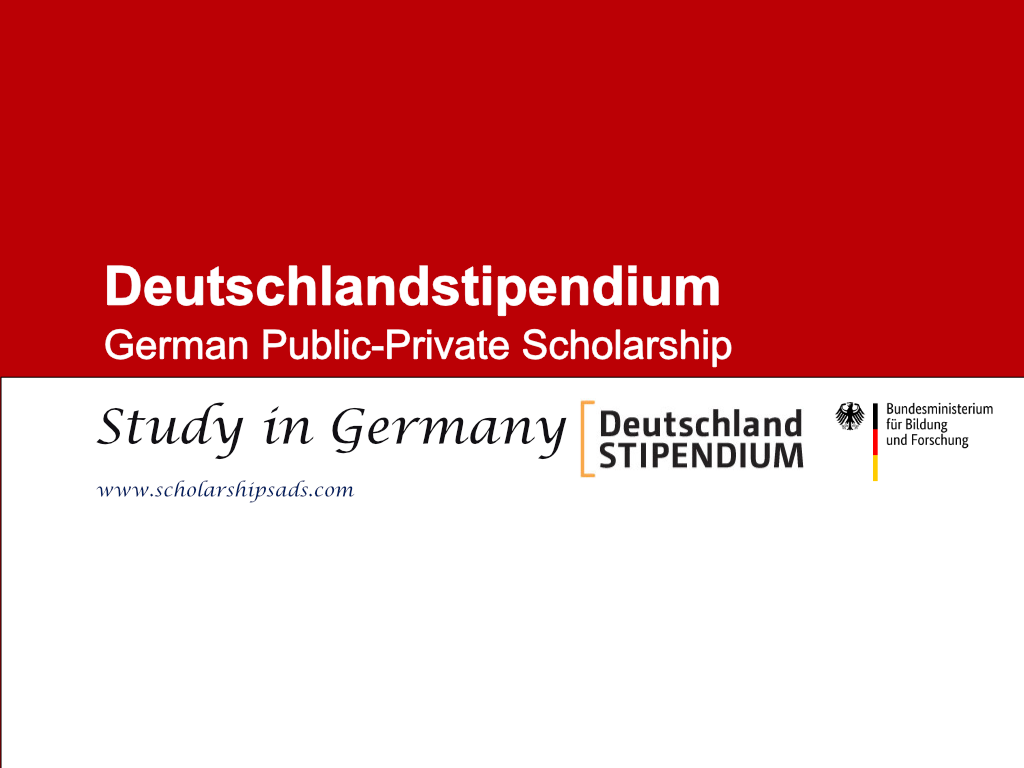
Deutschlandstipendium Public-Private Scholarship to Study in a German University
- Domestic Students, International Students
Deutschlandstipendium Public-Private Scholarship to Study in a German University is a Partial Funding scholarship in Germany offered by Germany Universities Germany . Domestic Students, International Students are eligible to apply and receive a scholarship for Bachelor, Masters, PhD in Deutschlandstipendium Public-Private Scholarship to Study in a German University . International students are required to comply with the admission criteria as per Germany Universities's admission rules and then apply for Deutschlandstipendium Public-Private Scholarship to Study in a German University.
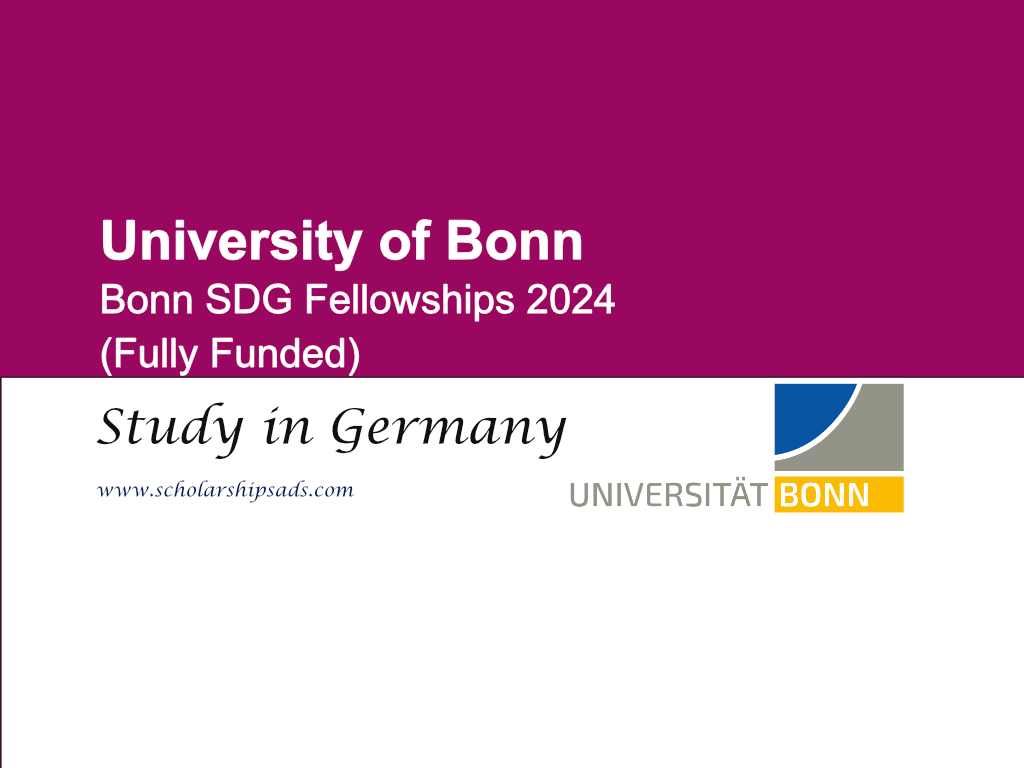
University of Bonn SDG Fellowships 2024 in Germany (Fully Funded)
- University of Bonn
University of Bonn SDG Fellowships 2024 in Germany (Fully Funded) is a Fully Funded scholarship in Germany offered by University of Bonn Germany . International Students are eligible to apply and receive a scholarship for PhD in University of Bonn SDG Fellowships 2024 in Germany (Fully Funded) . International students are required to comply with the admission criteria as per University of Bonn's admission rules and then apply for University of Bonn SDG Fellowships 2024 in Germany (Fully Funded).
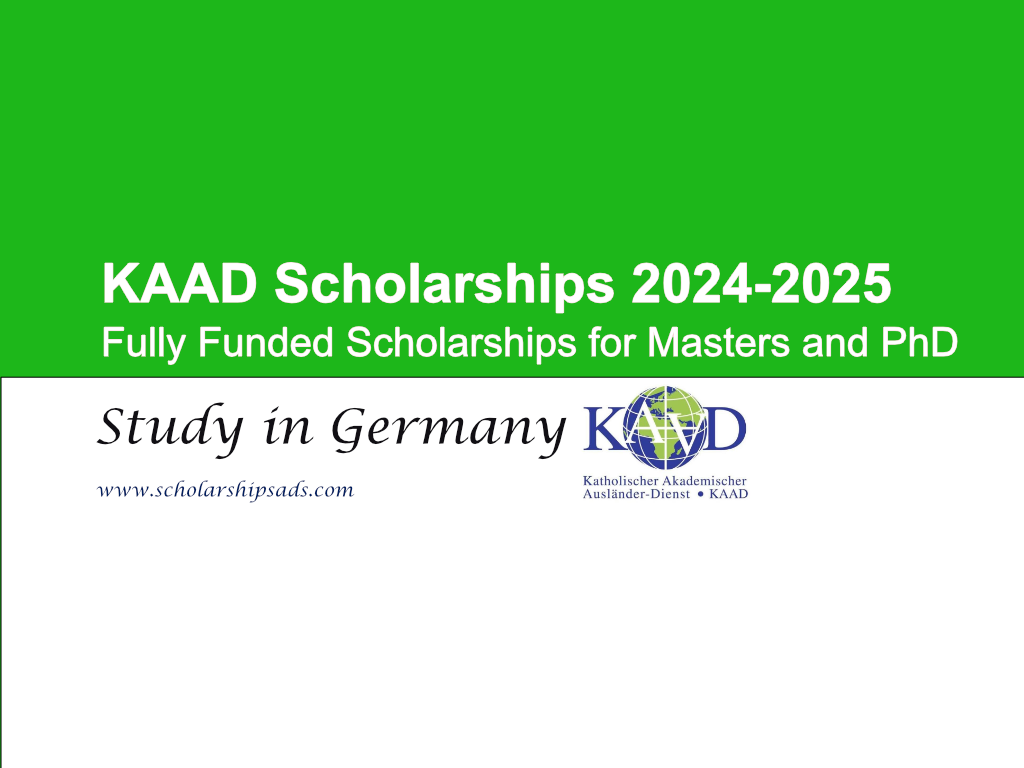
KAAD Scholarships 2024-2025 in Germany (Fully Funded)
KAAD Scholarships 2024-2025 in Germany (Fully Funded) is a Fully Funded scholarship in Germany offered by Germany Universities Germany . International Students are eligible to apply and receive a scholarship for Masters, PhD in KAAD Scholarships 2024-2025 in Germany (Fully Funded) . International students are required to comply with the admission criteria as per Germany Universities's admission rules and then apply for KAAD Scholarships 2024-2025 in Germany (Fully Funded).
Quick Links
- Facebook like 25.7 K
- twitter share
Recent Updates
- Scholarships
University of Ghana DASH Scholarships for MS and PhD (Fully Funded)
Western union foundation fellowship 2024 (fully funded), one young world iucn leaders forum changemakers scholarship 2024 in switzerland (fully funded), ca' foscari university of venice scholarships 2024/2025 in italy (fully funded), go city the london pass education scholarship 2024 in the uk, bournemouth university academic excellence scholarship 2025 in uk, university of bath sports scholarships 2024 in the uk, northumbria university sports scholarship 2024/2025/2026/2027 in uk, preparing your child for a harvard university scholarship as an international student, japan manga award 2024: an opportunity for international cartoon and manga artists, university of pavia italy announces 6 fully-funded cicops scholarships for 2025, caregiver continuing education: 7 ways to advance your career, london centre for nanotechnology announces phd positions for 2024, ontario tech university has 16 vacant postdoctoral and academic positions., 69 vacant postdoctoral and academic positions at arizona university, 41 faculty positions at toronto university, canada.
- Fully Funded Scholarships
- Undergraduate Scholarships
- Master Scholarships
- Ph.D Scholarships
- Post Doctoral
- Without IELTS Scholarships
- Medical Fields
- No Application Fee
- Fellowships
- Internships
- Intermediate
- Masters/MPhil
- Online Courses
- How to Write

List of Best International Scholarships in Germany 2024-25 for International Students:
German Universities are best in Research in all over the world. Hence, everyone wants to study in Germany. But due to Financial issue most of the students cannot make their dream true. To overcome this stress upon students we have prepare a List of Best Scholarships in Germany for International Students 2024. Go through this list and find a suitable Scholarship according to your interest. When a student studies in Germany he/she can get the chance to build cross-cultural understanding, work in International standard based labs under the supervision of top mentors. Also apply for McGill University Scholarships 2024-25 in Canada (Fully Funded) .
In this article we will discuss German Government Scholarships , Non-Government Scholarships , or Scholarships offered by different Universities of different degree levels. These are International Scholarships for Students from all over the world and mostly are Fully Funded Scholarships in Germany.
Scholarships in Germany for International Students Details:
Join Our WhatsApp Group if You not Joined it Already
Move to USA with work visa US EB3 Work Visa 2024 Process (Skilled and Unskilled Workers Jobs) .
Apply for Scholarships in Mexico Government Scholarship 2024-25 in Mexico (Fully Funded) .
Scholarships by German Government:
Government of Germany offers a lot of scholarships to students from all over the world to pursue their education in Germany. Here is the list of all scholarships offered by German Government to students.
1# DAAD Scholarships:
One of the best Scholarships in Germany for International Students by the German Academic Exchange Service (DAAD) at various degree levels in Germany. This Scholarship one of the best scholarships of the world for International Students for Masters and PhD Degree.
Official Link
2# erasmus+:.
It is the largest scholarship program in Europe for international students and one of the best scholarship programs in the world to pursue Masters Degree Program .
Non-Government Scholarships in Germany:
1# deutschland stipendium:.
Talented Students studying at German Universities can avail merit-based scholarships up to $300 per month.
2# Marie Skłodowska-Curie Research Fellowship Programme:
Marie Curie International Incoming Fellowships (IIF) are funded by the European Commission for International students wishing to pursue a postdoctoral research scholarship in Germany.
3# Einstein International Postdoctoral Fellowship:
International students can get a fellowship at the University of Berlin for postdoctoral research by the Einstein Foundation.
4# Mawista Scholarship:
Great scholarship opportunity for candidates who want to pursue studies in Germany along with the care of their child.
5# Konrad-Adenauer-Stifung Scholarships (KAS Scholarship):
Students who are under 30 years may apply for masters and Ph.D. Scholarships and have completed their bachelor’s degree from their home country.
6# The Helmholtz Association:
All international doctoral and postdoctoral students around the world can get fellowships annually and at Helmholtz center in Germany. This is an amazing opportunity for international researchers to paid research in Germany.
7# Heinrich Boll Scholarships for International Students:
The Heinrich Boll grants are available for the international graduates and PhD students. The scholarship is not available for undergraduate students.
8# Kurt Hansen Science Scholarships:
Students who are seeking to get scholarships in the field of science in Germany can apply in this category of scholarship, funded by the Byer Foundation.
9# Humboldt Research Fellowships for Postdoctoral Researchers:
This is a Post-doc research program in Germany. Interested international students from emerging and developing can apply for the Georg Forster Fellowship.
Scholarships provided by German Universities:
German Universities offers Scholarships in Germany for International Students to study free of cost. Here the list of scholarships offered by Universities of Germany.
1# Heidelberg University Scholarships for Students:
International Students studying dentistry or medicine belonging from developing countries can get a range of scholarships like the Amirana Scholarship.
2# KAAD Scholarships:
KAAD Scholarships is for students from developing countries. International Students who possess German-language skills, catholic-Christian denomination, and willing to pursue master’s or PhD level studies from developing countries can get scholarships by the KAAD scheme.
3# Universitat Hamburg Merit Scholarships:
All international students who have been enrolled in two semesters in any degree program will be considered for this merit scholarship as well as financial assistance.
4# Kofi Annan MBA Scholarships:
Kofi Annan MBA Scholarships are available for the students for developing countries. International students can get full-time MBA one-year scholarships belonging to the developing countries at the European School of Management and Technology (ESMT) in Berlin. Female candidates can get other ESMT’s Women Academic Scholarship.
5# RWTH Aachen University Scholarship and Funding Programs:
All International and domestic students of Germany can get financial assistance by applying to this scholarship.
6# Ludwig-Maximilians-Universität München & Universität Regensburg Scholarship
All International students who want to be a research fellow on the scholarship of SouthEast and East European Studies at a Graduate level can apply at Ludwig-Maximilians-Universitat Munich or Universitat Regensburg.
7# Ulm University Scholarships for International Scholarships:
All international students at Ulm University can get a one-semester need-based scholarship. The Ulm scholarship Germany is offered only for one semester.
8# DRD Scholarships for African Students in Germany:
At Ruhr-University Bochum, Sub-Saharan African students through merit-based scholarship can pursue their master’s degree.
9# FRIAS Cofund Fellowship Programme in Germany:
This Germany scholarship is available to international researchers to study at Universität Freiburg. The research fellowships are available in all disciplines.
10# Max Planck Institute for Chemical Physics of Solids:
For studying in the field of solid-state chemistry, candidates can apply for Post-doctoral Fellowships.
11# HHL Leipzig Graduate School of Management Scholarships:
HHL Leipzig Graduate School of Management scholarships is available for masters and PhD in management fields.
12 Best NGO Scholarships for Nigerian Students 2024 (Funded)
Bond university transformer scholarship 2024-25 in australia (funded), mcgill university scholarships 2024-25 in canada (fully funded), mexico government scholarship 2024-25 in mexico (fully funded), fulbright tampere university graduate award for us citizen 2024 in finland (fully funded), government of italy scholarships 2024-25 in italy (fully funded), scholarships by countries.
- Scholarships in Australia
- Scholarships in Austria
Scholarships in Canada
- Scholarships in China
- Scholarships in Finland
- Scholarships in France
- Scholarships in Germany
- Scholarships in Hungary
- Scholarships in Italy
- Scholarships in Japan
- Scholarships in Korea
- Scholarships in Netherlands
- Scholarships in New Zealand
- Scholarships in Saudi Arabia
- Scholarships in Singapore
- Scholarships in Switzerland
- Scholarships in Turkey
- Scholarships in UAE
- Scholarships in United Kingdom
- Scholarships in United States
Application Process
Most Popular
17000+ uk nhs visa sponsorship jobs 2024 in uk, i-765 application for employment authorization 2024: a comprehensive guide, decreto flussi work permits in italy 2024 | work in italy, highest paid canadian scholarships 2024 | scholarship to study in canada, 2024 intakes in canada for scholarships and admissions, popular posts, university of alberta scholarships 2024-25 in canada (fully funded), punjab food authority jobs 2023 online apply | food authority jobs advertisement, unicef traineeship 2024 | unicef summer internship 2023-24, popular categ.
- Scholarships 667
- Master Scholarships 423
- Fully Funded Scholarships 328
- Ph.D Scholarships 283
- Undergraduate Scholarships 269

Applying For a Master’s Degree in Germany
Master’s programs in Germany offer a diverse range of options, with many taught in English. They are known for their affordability, top-notch curricula, hands-on learning, and excellent career prospects. So, it’s no wonder that master’s degrees are the go-to choice for international students in Germany. During the 2021/2022 period, 42.6% of them (148,901 students) were enrolled in master’s programs.
But don’t let the application process hold you back – we’re here to guide you through the steps and set you on the path to success in Deutschland!
Here are the main steps to apply for a master’s degree in Germany:
Research and Choose a Master’s Program
Check admission requirements.
- Gather Documents and Meet All Requirements
Secure Funding
Submit your application, wait for the admission letter, get health insurance, apply for the german student visa.
When it comes to pursuing a master’s degree in Germany, the initial step is all about research and making an informed choice. Start by assessing your career goals and pinpoint the field of study that aligns with your aspirations. Look into the curriculum to ensure it covers the subjects that pique your interest.
Language matters too — many programs are available in English, but if you’re proficient in German, it opens up more options. When it comes to costs, most programs are quite affordable or even tuition-free, but be sure to check tuition fees just in case.
To aid your search, German study program databases and university websites offer detailed program information and application guidelines. Take your time to explore and find the program that’s the perfect fit for your educational journey.

Study at GISMA University of Applied Sciences
Be one step ahead with a globally recognised college in Germany!
> Check out our list of over 9,000 master’s study programs in Germany.
Once you’ve picked a couple of programs that pique your interest and align with your study goals, it’s time to check if you meet their admission requirements or can meet them by the application deadline.
While each program may have its unique requirements, let’s explore some of the most common admission criteria for master’s programs in Germany:
- Bachelor’s degree. You have graduated or will graduate from a program equivalent to a German bachelor’s degree, often in a related field to the master’s program you’re applying for.
- Transcripts and diplomas . Submit transcripts and copies of your academic diplomas from previous educational institutions.
- Subject-specific knowledge . Some programs may require you to have gained specific subject knowledge or credits during your prior education. Business schools and MBA programs may require a particular score from recognized tests, like GMAT or GRE.
- Language proficiency. Demonstrate proficiency in the language of instruction, which is typically English or German. Proof of language proficiency is often required through standardized tests like IELTS, TOEFL, TestDaF, or DSH.
- Curriculum vitae (CV) or resume . Provide a comprehensive CV or resume detailing your academic and professional background.
- Statement of purpose & letters of recommendation. Some universities may request a Statement of Purpose (SOP), which details your motivations and goals, along with one to two letters of recommendation from professors or professionals.
> Visit our full guide of admission requirements for master’s programs in Germany for more details.
Gather Documents and Ensure You Meet All Requirements
After reviewing admission requirements and selecting your program(s), it’s time to start gathering what you need for your application, including transcripts, motivation letter, etc.
This is also an ideal time to confirm that you meet your university’s language proficiency requirements. Depending on your program’s language (English or German), you may take a standardized language test or provide alternative proof. Consider language courses if improvement is needed.
According to the German government’s regulations, international students planning to study in Germany must demonstrate financial resources of at least €11,208 per year (equivalent to €934 per month) to qualify for a student visa and pursue a master’s degree in the country.
This financial requirement may seem daunting for many students, so it’s crucial to address this well in advance of the official application period at your preferred German university. You can meet this requirement in various ways:
- Having €11,208 deposited in a German blocked account .
- Your parents can provide documentation of their income and financial resources.
- Someone with permanent residence in Germany can guarantee to the Alien Registration Office that they will financially support you.
- Present a scholarship awarding certificate specifying the financial amount or coverage granted to you.
Important Tip: To Maximize Your Chances of Getting Your German Student Visa You Should Use a Blocked Account as Proof of Financial Resources.
A blocked account is a special type of bank account , to prove you have enough funds to live in Germany for one year.
As of 2022, as a foreigner in Germany you need a minimum of €934 euros per month for living expenses. So, you are required to have a total of €11,208 in your bank account before you apply for a German internship visa.
Click here to learn more about the German Blocked Account
Planning ahead is important before your preferred German university’s application deadline, as this amount may be substantial for most students. Usually, four to six months prior should provide enough time to save money and explore scholarship and loan options.
Now is the exciting time to send in your application! Most universities have their own application portals where you’ll need to create an account, or they might use uni-assist for handling applications.
Make sure to read and follow all the instructions on the master’s program website, and be sure to submit all the required documents. It’s crucial to respect the application deadlines; your application won’t be processed if you miss the deadline.
Once your application is submitted, the next step is simply waiting for the university’s decision. While you wait, you might want to brush up on your language skills or start looking into the specific visa and travel requirements for Germany. It’s also a good time to explore accommodation options.
The university will notify you via email about the status of your application, and if you’re accepted, they’ll include the next steps you should follow.
Health insurance is a must for all international students in Germany. You can kickstart this process after receiving your admission letter or once you arrive in Germany.
If your home country has an agreement with Germany, you can often use your current health insurance, typically with a European Health Insurance Card (EHIC). In some cases, private health insurance from other countries may also be accepted.
Alternatively, you can choose to obtain insurance through a provider in Germany, with student packages usually priced around €120 per month, depending on your age and the provider.
Most international students in Germany prefer to get health insured with DR-WALTER .
EDUCARE24 by DR-WALTER is suitable for the following groups of people:
- Foreign exchange students, language students and students participating in university preparatory courses (Studienkolleg)
- University students
- Participants in exchange programmes (e.g. ERASMUS, DAAD, SOKRATES)
- Accompanying family members
Still have questions about health insurance? Learn more about health insurance in Germany from experts.
Get DR-WALTER insurance online within a few minutes
With a few exceptions, the majority of international students planning to study in Germany require a student visa. Our German student visa guide covers everything you need to know about this process, from requirements to the application process, fees, and more.
To kickstart the process, set up a visa interview at the German Embassy or Consulate in your home country, ideally about three months before your planned start of studies.
During the interview, provide all the required documents like proof of admission, language proficiency, financial means, and health insurance. Be ready for potential requests for more documents during the interview, and make sure your passport stays valid for your entire stay.
Arrive in Germany and Attend Orientation
Once your German student visa is sorted, it’s time to get on that plane and arrive in Germany. After settling in, make use of the pre-semester orientation sessions at German universities. Some things addressed through the orientation or to over on your own include:
- You’ll complete the enrollment process , which involves registering for your courses, receiving your class schedule, and learning about academic requirements.
- Getting your student ID . You’ll be issued a student identification card, often referred to as a “Studierendenausweis” in German.
- Residence registration. Once you’re in Germany, you will have to register your residence. This is a mandatory process that involves obtaining a “Meldebescheinigung” from the Resident’s Registration Office (Einwohnermeldeamt).
- Opening a local bank account. Orientation often provides guidance on opening a bank account in Germany.
- Campus tour. You’ll explore the campus to discover its facilities, libraries, and labs.
- Language courses. Some universities offer language courses or resources to help international students improve their German language skills if necessary.
Frequently Asked Questions (FAQ) & Additional Information
Below, you’ll find answers to common questions and additional information to support you on your path to pursuing a master’s degree in Germany:
Which Universities Offer Master’s Degree Programs in Germany?
The higher education system in Germany includes public universities, funded and regulated by the state, and private universities established by independent entities.
While private universities may have higher fees, they are valuable for specialized courses not available at public institutions. Public universities in Germany have their own degree programs, assessments, and entry requirements, with state oversight to ensure the quality and accreditation of courses.
Germany has four main types of higher education institutions that offer master’s degree programs:
- Research Universities. These publicly administered institutions offer Master’s and PhD programs, focusing on various academic disciplines.
- Technical Universities. A subgroup of research universities, they specialize in science, technology, and engineering fields.
- Universities of Applied Sciences. These institutions concentrate on engineering, business, and social sciences, often partnering with professional organizations.
- Colleges of Art, Film, and Music. These institutions provide instruction in creative fields and can be part of research universities or universities of applied sciences.
What Are the Types of Master’s Degrees in Germany?
In Germany, you can pursue various types of Master’s degrees. Some of the most common include:
- Master of Arts (MA). Awarded in humanities, social sciences, and arts-related fields.
- Master of Science (MSc) . Awarded in science, technology, engineering, and mathematics (STEM) disciplines.
- Master of Business Administration (MBA). Focuses on management and business administration topics.
- Master of Education (M.Ed.). For degrees for high school teacher positions.
What Are Consecutive and Non-consecutive Master’s Degrees?
Consecutive master’s Degrees in Germany follow a logical progression from a related bachelor’s degree and build upon the same academic field. They provide in-depth knowledge and specialization within the same subject area.
Non-consecutive master’s Degrees, on the other hand, don’t necessarily need a bachelor’s degree in the same field. Students with diverse academic backgrounds can go for non-consecutive master’s programs, which often focus on broader skills and interdisciplinary knowledge. These programs may include extra coursework to bridge any knowledge gaps.
How Long Is a Master’s Degree in Germany?
A master’s degree in Germany typically lasts for one to two years, depending on the specific program and the number of semesters required. Each academic year consists of two semesters, and the program may also include a final project or dissertation conducted in collaboration with a mentor.
How Many ECTS Credits Is a German Master’s Degree Worth?
Master’s programs in Germany typically consist of 120 ECTS (European Credit Transfer and Accumulation System) credits. However, the exact number of credits may vary depending on the university and the specific program.
What is Numerus Clausus?
Numerus Clausus (NC) in German master’s programs is a restricted admission system where limited spots are available, and selection is based on factors like academic performance and qualifications. It controls program capacity to prevent overcrowding. Applicants compete for admission based on their qualifications, and requirements vary by program.
When Are Application Deadlines for Master’s Degrees in Germany?
There are two semesters in German universities; the winter semester and the summer semester. Application deadlines for master’s programs vary depending on the university, however, the most common dates are:
- For courses starting on the winter semester: July 15th
- For courses starting on the summer semester: January 15th
Can I Apply for a Master’s in Germany Before I Get My Undergraduate Degree?
Yes, it’s common for students to apply during the final year of their bachelor’s degree. However, you must provide proof of your current academic progress and an expected graduation date as part of your application.
What Are the Language Requirements for Master’s Degrees in Germany?
If your courses are in German, you’ll need to prove your proficiency through tests like TestDaf or DSH. A lower level of proficiency may be accepted if you continue taking language courses upon arriving in Germany or during the early stages of your Master’s program. However, language requirements for master’s programs in Germany can vary depending on the university and program
If you choose English-taught programs, no German language tests are required. Non-native English speakers may need to take English language tests like TOEFL, IELTS, and PTE. If you’ve completed your undergraduate studies in English, you typically won’t need English language tests.
To discover programs in your preferred language, explore our tool and select the program language from the options on the left.
How Much Does a Master’s Degree Cost in Germany?
In most public universities in Germany, semester fees for master’s programs typically range from €100 to €350 per semester, with some exceptions. Some specialized graduate programs may have tuition fees, and the federal states of Baden-Württemberg and Bavaria may charge tuition fees for non-EU international students.
Private universities set their own tuition fees, and the cost of master’s degrees can vary significantly, especially for programs like MBAs. At private universities in Germany, tuition fees can range from approximately €5,000 to €20,000 per year or more, depending on the institution and program.
To find out more about the costs of studying in Germany, visit our extensive guide .
Can I Work While Studying for a Master’s Degree in Germany?
Yes, students of all nationalities can work while studying for a master’s degree in Germany.
- EU, EEA, Swiss, and Norwegian students can work up to 20 hours per week. They can exceed this number, however they will have to pay social security contributions.
- Non-EU students can work up to 120 full days or 240 half days per year, but they face restrictions on self-employment and freelancing.
- Academic assistants have no limitations on workdays but are required to inform the foreigners’ office.
> Read more about working while studying in Germany .
What Is the Master’s Thesis Process Like in Germany?
In your final year of a master’s program in Germany, you’ll work on your thesis project, guided by a professor. The goal is to showcase your ability to tackle a subject-related issue independently using research methods.
You can usually write your thesis in German or English and may even complete it externally, like at a company or another research institute. Universities often set page limits, usually between 50 to 100 pages, and impose deadlines, typically around six months from the project start.
The thesis defense involves submitting your work and presenting your research methods and findings.
Study Visa Requirements for a Master’s Degree in Germany
Make sure you collect on time all the documents you typically need in order to apply for a German Student Visa .
For detailed information about Germany Visa requirements, go to www.germany-visa.org/student-visa/
What Are the Career Prospects With a German Master’s Degree?
With a German master’s degree, you’ll have excellent career prospects, especially in STEM fields . EU/EEA graduates can work immediately after graduation, while non-EU/EEA graduates can extend their residence permits for up to 18 months to find field-related jobs.
You can also pursue academic careers, and highly skilled non-EU graduates can apply for an EU Blue Card to work and stay in Germany. Plus, your German degree is globally recognized, offering international career opportunities in multinational companies and organizations.
Join 262,114 students interested in studying in Germany

Download The Guide

Quick Links
8 Steps to Study in Germany How To Apply To Study in Germany German Education System Requirements Universities in Germany International Programmes Financing Your Studies German Student Visa German Health Insurance Germany Blocked Account Learn German Guide German Cities Cost of Living
Latest News and Statistics
Higher education in germany: key trends & statistics, new study reveals high level of satisfaction among students at german universities, germany scholarships up by 3% in 2023 – 31,400 students benefited, indians overcome chinese as top source of international students in germany, over 3,800 university students in germany were under 18 in 2022.
- Privacy Policy
- Cookie Policy

DASH Masters and PhD Scholarship 2024 at University of Ghana
The University of Ghana School of Public Health is pleased to announce the call for applications for the DASH Master’s and PhD Scholarships in Adolescent Health for the 2024/2025 academic year. This scholarship opportunity is aimed at individuals passionate about making a significant impact on adolescent and young adult health in sub-Saharan Africa.

The DASH project, or the Research Network for Design and Evaluation of Adolescent Health Interventions and Policies in Sub-Saharan Africa, is a multi-country study funded by the German Federal Ministry of Education and Research. It aims to promote and improve adolescent health through targeted research in three main domains: sexual and reproductive health, nutrition and physical activity, and mental health and violence. This project brings together institutions from Ghana, Burkina Faso, Ethiopia, Nigeria, South Africa, Tanzania, Uganda, and Germany to foster a comprehensive understanding and intervention framework for adolescent health challenges.
Benefits of DASH Scholarship
The DASH scholarship offers a comprehensive package to support students throughout their studies at the University of Ghana. The benefits include:
- Full tuition fees coverage.
- Research funding for dissertation or thesis.
- On-campus accommodation costs.
- Monthly stipend for living expenses (PhD).
- Support for attending relevant conferences and workshops (PhD).
Eligibility Criteria
To be eligible for this DASH scholarship, applicants must meet the following criteria:

- Be willing to undertake full-time study.
- Demonstrate ability to conduct independent statistical data analysis.
- Show willingness to work in a multidisciplinary team.
- Meet the University of Ghana’s admission requirements for postgraduate studies.
- Be capable of conducting fieldwork in challenging settings.
- For PhD applicants, having previous publication experience is an added advantage.
- Be under the age of 40 years.
- Female applicants are strongly encouraged to apply.
Who Can Apply?
Master’s Applicants :
- Hold a good first degree in relevant fields.
- Have at least two years of work experience in a health-related field.
PhD Applicants :
- Hold a master’s degree in disciplines related to health such as Public Health, Applied Epidemiology, Global Health, among others.
- Have at least two years of post-master’s work or research experience, preferably in a health-related field.
Application Process
Step 1: University of Ghana Postgraduate Application
- Apply online to either the Master of Public Health or PhD Public Health programme (Population, Family, and Reproductive Health) at the University of Ghana ( https://admission.ug.edu.gh/applying/postgraduate/overview ).
- Participate in competitive entrance examinations, which include analytical essays and basic data analysis.
Step 2: DASH Scholarship Application
- Complete the DASH Scholarship Application form online at this link ( https://apply.ug.edu.gh/apps/chsdash/#/ ).
- A one-page cover letter.
- Full curriculum vitae (CV) highlighting statistical analysis skills and research experience.
- Personal statement (1 page for master’s and 2 pages for PhD applicants) indicating suitability for the scholarship.
- At least one letter of recommendation.
- Proof of application to the relevant postgraduate programme at the University of Ghana.
Step 3: Interview for Shortlisted Applicants
- Shortlisted candidates will be invited for an interview.
- Successful candidates will be notified by 15 August 2024.
Application Deadline
The deadline for submitting applications for University of Ghana’s Dash scholarship is 14 June 2024 as per this notice https://www.ug.edu.gh/sites/default/files/documents/Call%20for%20Master%27s%20and%20PhD%20Scholarship%20Applications_DASH_Final.pdf .
Successful applicants will receive an award letter from the University of Ghana and will have seven days to confirm their acceptance. Failure to respond within this timeframe will result in the scholarship being offered to another candidate.
Zahira Bano
Related articles.
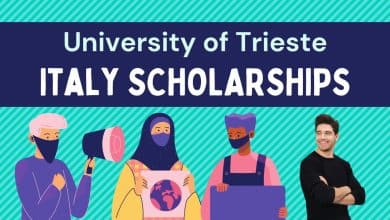
University of Trieste Scholarships 2024 in Italy

International Australian Alumni Scholarship 2024 at ECU Australia

Kenneth Denbigh Scholarship 2024 for Students

Catalonia Quantum Academy Scholarships 2024
Leave a reply cancel reply.
Your email address will not be published. Required fields are marked *
Save my name, email, and website in this browser for the next time I comment.
Thank you for visiting nature.com. You are using a browser version with limited support for CSS. To obtain the best experience, we recommend you use a more up to date browser (or turn off compatibility mode in Internet Explorer). In the meantime, to ensure continued support, we are displaying the site without styles and JavaScript.
- View all journals
- Explore content
- About the journal
- Publish with us
- Sign up for alerts
- Published: 15 May 2024
How Iranian students can master integration into German academia
- Ata Makarem ORCID: orcid.org/0000-0003-1291-4312 1 , 2 &
- Karel Douglas Klika ORCID: orcid.org/0000-0001-7009-1487 3
Nature Physics ( 2024 ) Cite this article
207 Accesses
Metrics details
Thousands of Iranians study at German universities every year, but many struggle with the German academic system. Here, we offer some advice.
This is a preview of subscription content, access via your institution
Access options
Access Nature and 54 other Nature Portfolio journals
Get Nature+, our best-value online-access subscription
24,99 € / 30 days
cancel any time
Subscribe to this journal
Receive 12 print issues and online access
195,33 € per year
only 16,28 € per issue
Buy this article
- Purchase on Springer Link
- Instant access to full article PDF
Prices may be subject to local taxes which are calculated during checkout
Knerr, B. International Labor Migration: Asian students in Germany Ch. 6 (Kassel University Press GmbH, 2015).
Hüther, O. & Krücken, G. Higher Education in Germany — Recent Developments in an International Perspective , Vol. 49 (Springer International Publishing, 2018).
Moradi, S. Nat. Hum. Behav. 3 , 1025–1025 (2019).
Article Google Scholar
Download references
Author information
Authors and affiliations.
Department of Chemistry, University of Hamburg, Hamburg, Germany
Ata Makarem
Mannheim Business School, University of Mannheim, Mannheim, Germany
Molecular Structure Analysis, German Cancer Research Center (DKFZ), Heidelberg, Germany
Karel Douglas Klika
You can also search for this author in PubMed Google Scholar
Corresponding author
Correspondence to Ata Makarem .
Ethics declarations
Competing interests.
The authors declare no competing interests.
Rights and permissions
Reprints and permissions
About this article
Cite this article.
Makarem, A., Klika, K.D. How Iranian students can master integration into German academia. Nat. Phys. (2024). https://doi.org/10.1038/s41567-024-02490-4
Download citation
Published : 15 May 2024
DOI : https://doi.org/10.1038/s41567-024-02490-4
Share this article
Anyone you share the following link with will be able to read this content:
Sorry, a shareable link is not currently available for this article.
Provided by the Springer Nature SharedIt content-sharing initiative
Quick links
- Explore articles by subject
- Guide to authors
- Editorial policies
Sign up for the Nature Briefing newsletter — what matters in science, free to your inbox daily.
Sweden and the Netherlands: 16 fully-funded PhD positions

Are you looking for exciting PhD positions at esteemed universities in Sweden and the Netherlands ?
Over 16 fully-funded multiple doctoral scholarships in diverse fields are available at various universities in Sweden and the Netherlands for the year 2024. These fellowships provide funding for doctoral researchers to conduct their research projects at universities, research institutions, and other organizations in these countries. These PhD positions are funded by prestigious sources including the MSCA doctoral program and other funding programs.
For detailed information on specific doctoral positions, please visit the provided links to explore corresponding PhD scholarships, which include specific requirements and application procedures.
PhD positions available in Swedish universities:
1. Computational condensed matter physics, Linköping University
2. Urban Freight Management, Chalmers University of Technology
3. eDNA environmental monitoring, Sveriges lantbruksuniversitet
4. Cyber-Physical Systems (CPS), Luleå University of Technology
5. Medical Science - Regional differences in gestational duration, University of Gothenburg
6. Computational Sciences within the national Data-Driven Life Sciences program, Umeå universitet
7. Computational biology of infection, Lunds universitet
PhD positions available in Dutch/Netherlands universities:
8. Donders Centre of Neuroscience - Motor Disorder Rehabilitation, Radboud University
9. Human-aligned Video-AI, University of Amsterdam (UvA)
10. Multivariate Dependence Modelling and Statistical Machine Learning Algorithms for Patient Risk Profiling, Delft University of Technology (TU Delft)
11. Computational Cognitive Neuroscience at the Predictive Brain Lab, Radboud University
12. Atmospheric Sciences - Unraveling the mesoscale organisation of shallow convective clouds for better climate projection, Wageningen University & Research
13. Dynamic On-Body and In-Body Compression Systems, University of Twente (UT)
14. Modelling Micropollutant Removal using Charge-Mosaic Nanofiltration Membranes, University of Twente (UT)
15. Economic Life Cycle Costing and Life Cycle Sustainability Assessment of Hydropower, University of Twente (UT)
16. Environmental Life Cycle Assessment of Hydropower, University of Twente (UT)

IMAGES
VIDEO
COMMENTS
A comprehensive overview of DAAD scholarship programmes is available in our scholarship database: www.funding-guide.de. DAAD scholarships do not have to be paid back. They usually consist of a monthly scholarship payment (currently, for example, € 934 for graduates and € 1,200 for doctoral/PhD students) and a flat-rate travel allowance.
The University of Hamburg offers doctoral scholarships and grants of up to € 1.200 to (prospective) doctoral candidates studying at the University of Hamburg. We are happy to assist you with any. Published: 16 Nov 2022 Type: PhD Study in: Germany Deadline: 02 Dec 2022.
The scholarship is for outstanding undergraduate and doctoral students in Germany, including German, EU-European, and eligible international students. It's funded by the Federal Ministry of Education and Research (BMBF) and managed by 13 organizations, such as Avicenna-Studienwerk, Cusanuswerk, Ernst Ludwig Ehrlich Studienwerk, and others.
International student community. Germany welcomes a diverse and thriving international student community, with over 458,210 international students studying across the country. ... DAAD offers the highest number of doctoral scholarships. PhD students get an average monthly stipend of €1,139.
On the other hand, German PhD scholarships and fellowships are usually tax-free, but you may need to pay for health insurance separately. ... Research grants for doctoral programmes in Germany are for international students to complete a PhD at a German institution. Scholarships last for up to four years and provide €1,300 per month, plus ...
Munich Aerospace PhD scholarships allow talented young scientists to focus exclusively on the research work at hand and on attaining a timely doctoral degree. ... Research Grants - Doctoral Programmes in Germany. International PhD students can realise a doctoral project (individually or in a structured programme) at a state or state ...
The duration and level of funding varies for different types of studies. Graduates (master or postgraduate students) receive a monthly scholarship of € 934. The standard funding period is two years. After having obtained unconditional admission to doctoral studies at a German university, PhD-students receive a monthly scholarship of € 1.400.
PhD Studies. With a long tradition of research and ground breaking discoveries, Germany is indeed a land of innovation and progress. Besides giving your ideas a research-based boost, Germany also offers promising career opportunities along with a vibrant social and cultural milieu. So like for many other international students, it can be the ...
You can find out more about studying a PhD in Germany here. Heinrich Böll Scholarships for International Students - Scholarships for international students at all levels wishing to study in Germany at an accredited institution. (The deadline for the 2019 round of applications has passed. Please check back later for the 2020 round.)
PhD in Germany is a 3-5 year long program, available to international students across various top universities. You might need top pay a semester fee between 100 and 325 EUR (8,900 to 28,930 INR) to pursue PhD courses in Germany. Know more about admission, fees, financial aid, and work opportunities after PhD in Germany!
There are essentially three types of PhD scholarships in Germany: Governmental Financial Aid; Assistance by Non-Government Organizations; German University Fellowship; Potential aspirants can receive fully funded PhD in Germany for international students thanks to several scholarships. PhD stipend in Germany varies among different scholarships.
Eligible Courses: Cultural, Political, Historical, Economic & Social aspects of modern and contemporary German affairs. Deadline: 01, Nov 2024. Eligible Nationalities: Open to citizens/permanent residents of the USA and Canada. Scholarship can be taken at: universities & research institutions in Germany. Shortlist.
How do I apply for a DAAD scholarship? 2. In the Call for Applications it is said that I have to apply through the DAAD portal. 3. The Call for Applications states that I have to submit a reference from a university teacher. Who can write a reference for my application? 4. Do I have to apply in German? 5.
Friedrich Naumann Foundation Scholarship for International Students. Friedrich Naumann Foundation. Masters/PhD Degree. Deadline: 31 Oct/30 Apr (Annual) Study in: Germany, Switzerland. Course starts April/Oct 2024.
Phone: +49 89 2180-9727. Email: [email protected]. SIST LMU Study Completion Scholarship. This semester-long scholarship, available by application to LMU's International Office and funded by the German Academic Exchange Service (DAAD), is for international students and doctoral students at LMU who are registered at the time of application ...
Friedrich Schiller University Jena. Jena, Germany. 1 of 2. Find exclusive scholarships for international PhD students pursuing Social Sciences studies in Germany. Search and apply online today.
International Students are eligible to apply and receive a scholarship for Masters, PhD in KAAD Scholarships 2024-2025 in Germany (Fully Funded) . International students are required to comply with the admission criteria as per Germany Universities's admission rules and then apply for KAAD Scholarships 2024-2025 in Germany (Fully Funded). Prev. 1.
Here is the List of Best Scholarships in Germany for International Students 2024. German Government Scholarships for Students. Wednesday, May 22, 2024. Home. Scholarships ... PhD: Scholarship coverage: Fully Funded: Eligible nationality: All Nationalities: Award country: Germany: Last Date: Vary: Join Our WhatsApp Group if You not Joined it ...
Master's programs in Germany offer a diverse range of options, with many taught in English. They are known for their affordability, top-notch curricula, hands-on learning, and excellent career prospects. So, it's no wonder that master's degrees are the go-to choice for international students in Germany. During the 2021/2022 period, 42.6% of them (148,901 students) were […]
The University of Ghana School of Public Health is pleased to announce the call for applications for the DASH Master's and PhD Scholarships in Adolescent Health for the 2024/2025 academic year. This scholarship opportunity is aimed at individuals passionate about making a significant impact on adolescent and young adult health in sub-Saharan Africa. The DASH …
Many PhD students in Germany are employed by the university and thus must often work as teaching assistants; in many cases, even PhD candidates in receipt of a scholarship are required to teach.
Are you looking for exciting PhD positions at esteemed universities in Sweden and the Netherlands?. Over 16 fully-funded multiple doctoral scholarships in diverse fields are available at various universities in Sweden and the Netherlands for the year 2024. These fellowships provide funding for doctoral researchers to conduct their research projects at universities, research institutions, and ...